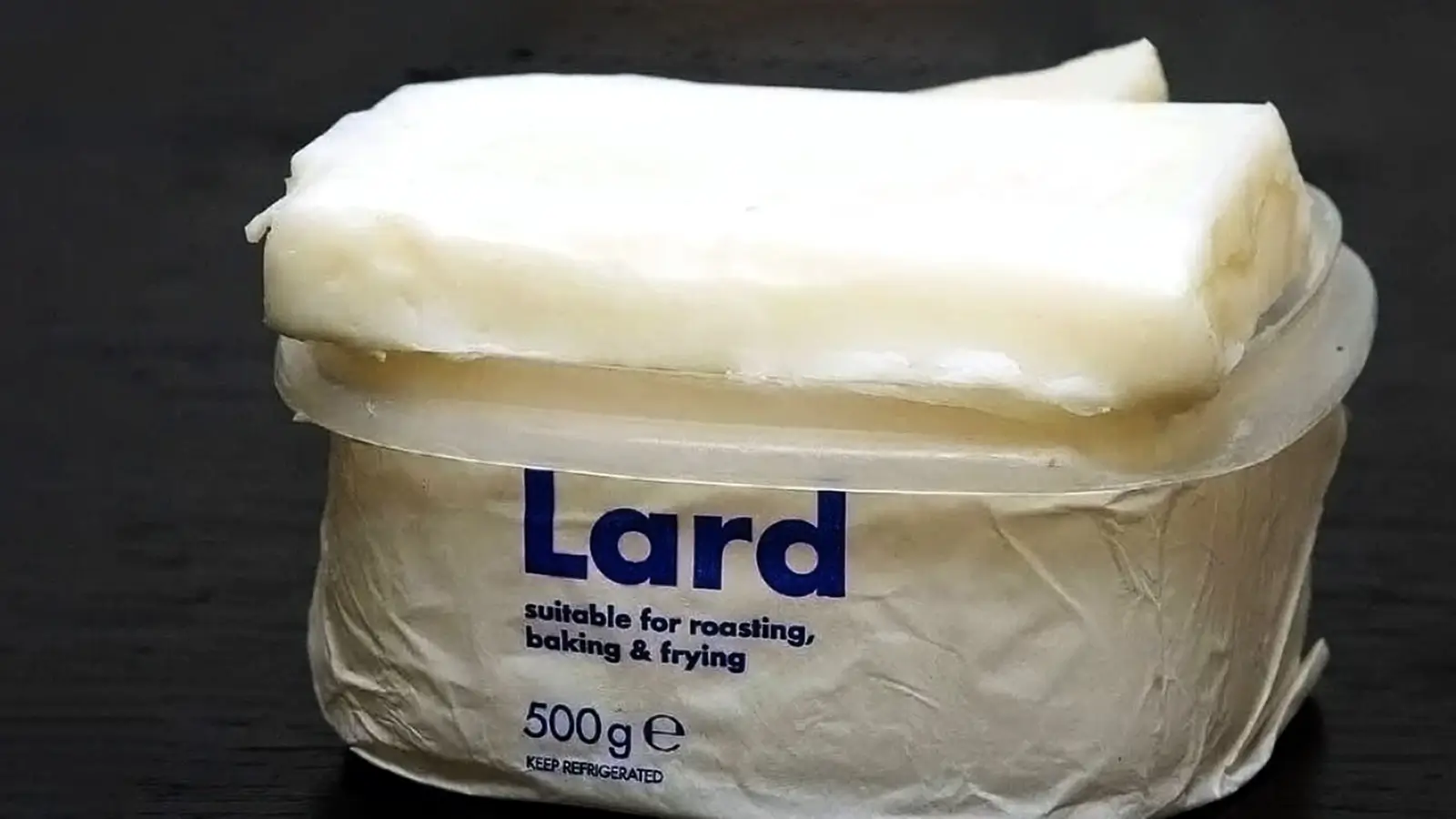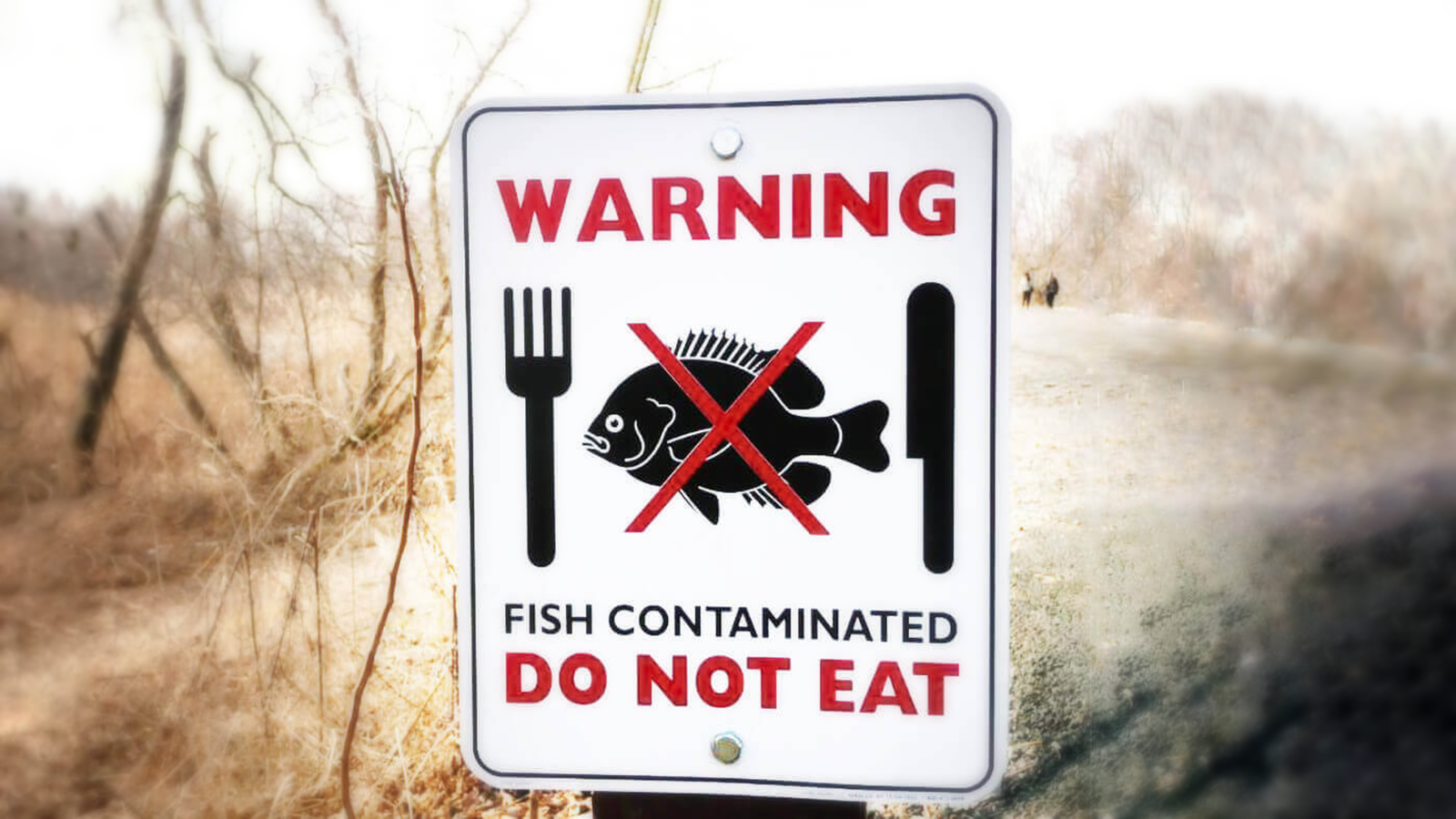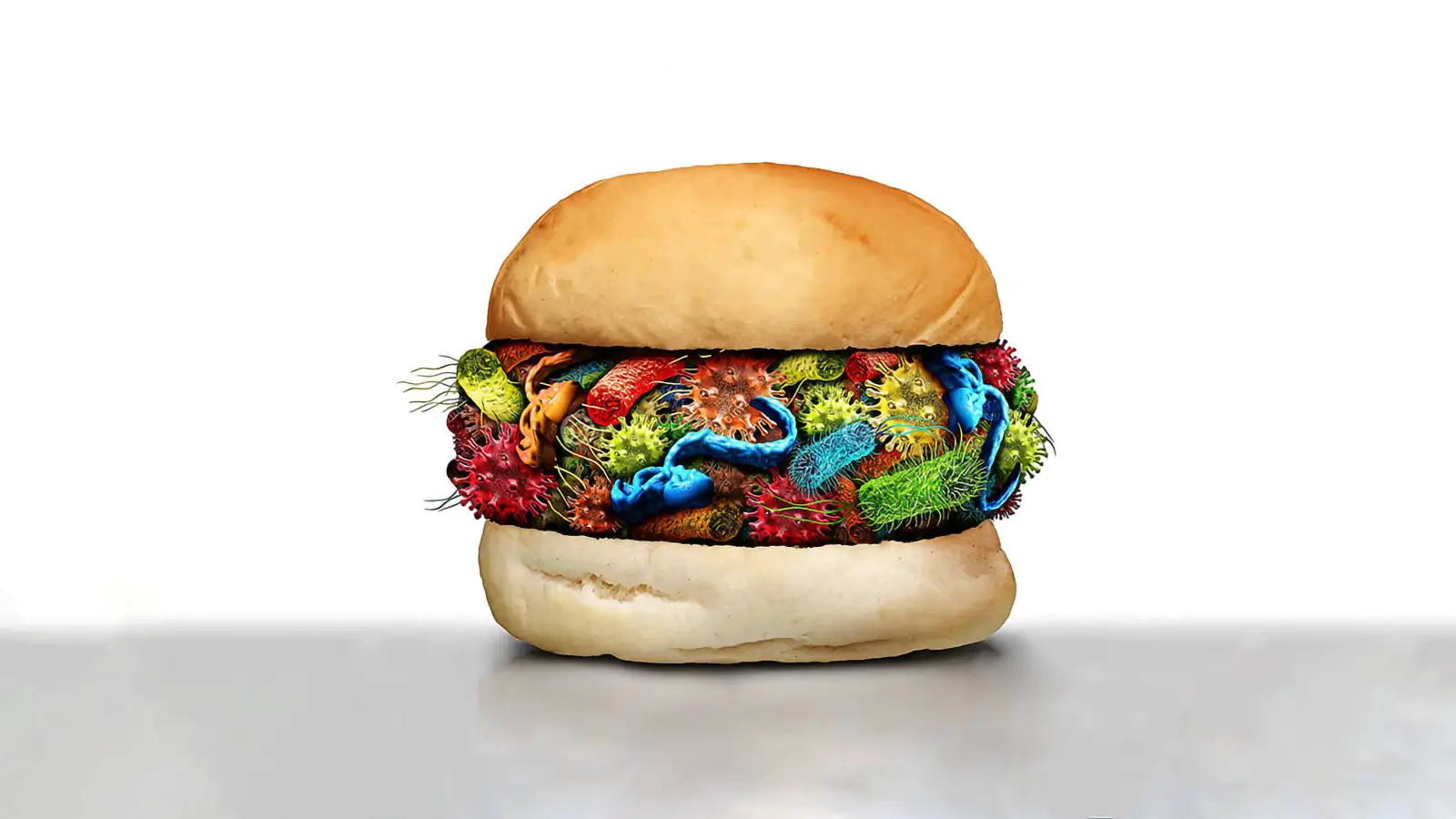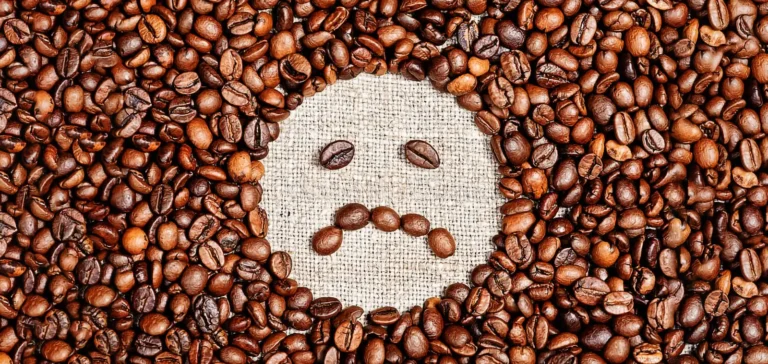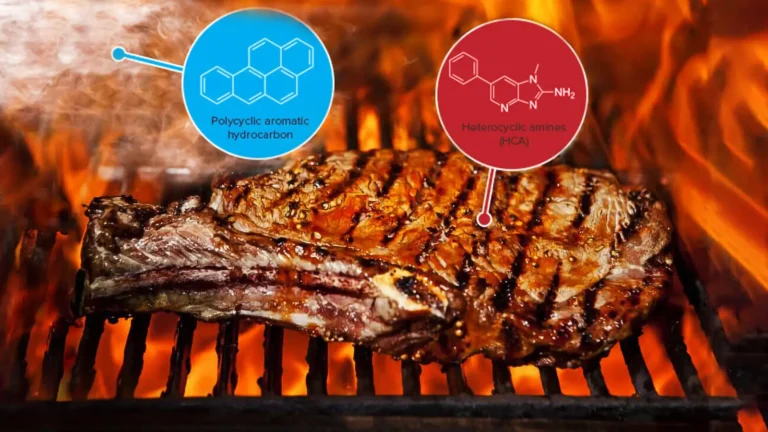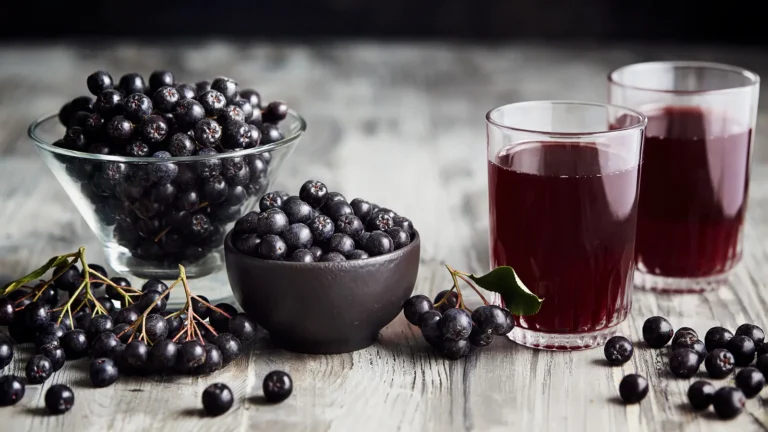Deficiencias Nutricionales en la Dieta Vegana: Estrategias de Prevención
Conozca las deficiencias de nutrientes más comunes en las dietas veganas y cómo prevenirlas con la suplementación y la elección de alimentos adecuadas.
Milos Pokimica
Escrito por: Milos Pokimica
Revisado Médicamente Por: Dr. Xiùying Wáng, M.D.
Actualizado el 10 de junio de 2023Principales Conclusiones:
- Durante las últimas décadas, especialmente desde finales de los años 70 y en la época del informe Mc Govern en adelante, se ha reconocido que la dieta occidental estándar es la fuente principal de todas las enfermedades de la opulencia, como las cardiopatías y los accidentes cerebrovasculares, el cáncer y la diabetes (Sinha et al., 2009).
- Se ha demostrado que una dieta basada en alimentos integrales de origen vegetal está asociada a varios resultados beneficiosos para la salud y puede prevenir las enfermedades de la opulencia.
- Nutrientes como la vitamina B12, el yodo y la vitamina D pueden faltar si no se planifica adecuadamente una dieta vegana.
- El exceso de hierro es proinflamatorio y puede provocar la muerte celular y enfermedades relacionadas con la inflamación.
- Lo más probable es que la anemia en los veganos esté causada por una deficiencia de B12, en primer lugar, y por una deficiencia de zinc, en segundo lugar, y por una deficiencia de hierro, en tercer lugar. Para tratar la anemia causada por niveles bajos de hierro debe tomar una píldora de vitamina C o 500 mg después de la comida sólo después de haber normalizado sus niveles de zinc y B12 primero y todavía tienen niveles de hierro por debajo del valor normal bajo.
- Los veganos pueden necesitar hasta 50% más de zinc que los omnívoros debido a su menor biodisponibilidad.
- Idea de que un la dieta vegana carece de proteínas ha sido desmentida por la investigación científica. Nuestro cuerpo recicla las proteínas de las células muertas mediante un proceso llamado autofagia.
- La sobrealimentación constante de proteínas de alta calidad puede tener graves consecuencias para la salud, incluido el cáncer, ya que eleva los niveles de aminoácidos y aumenta la liberación de hormonas IGF-1. El consumo excesivo de ciertas plantas proteínas como la soja pueden anular algunos de los beneficios de una dieta vegana sobre la prevención del cáncer y la longevidad debido a los elevados niveles de hormonas IGF-1.
- La osteoporosis no es una enfermedad por deficiencia de calcio, sino más bien una enfermedad crónica por deficiencia de vitamina D. Sin embargo, la carencia de magnesio también es frecuente en las dietas no veganas y puede contribuir a la osteoporosis.
- No se recomienda consumir grandes cantidades de suplementos de calcio o alimentos enriquecidos, ya que pueden provocar picos en el torrente sanguíneo que lleven a calcificaciones en las arterias y, potencialmente, a problemas cardiovasculares. Lo mejor es obtener la ingesta diaria de calcio únicamente de fuentes de alimentos integrales.
- La vitamina K2 no es en realidad una vitamina, pero nuestro cuerpo puede producirla a partir de la vitamina K1 que se encuentra en las plantas. También se encuentra en alimentos fermentados como el natto, el chucrut y el kimchi.
- Los veganos tienen que tomar suplementos de B12 para asegurarse de que reciben los niveles adecuados de esta vitamina. Las fuentes vegetales de B12 no se consideran fiables ni suficientes.
- Las personas que siguen una dieta basada en plantas no consumen creatina en su dieta y pueden beneficiarse de tomar un suplemento de creatina para reducir los niveles de homocisteína.
- DHA significa ácido docosahexaenoico y es un ácido graso omega-3 que se encuentra en los productos animales y desempeña un papel clave en el desarrollo de los tejidos oculares y nerviosos. Se puede consumir un ácido graso omega-3 de origen vegetal, el ácido alfa-linolénico (ALA), que el organismo convertirá en EPA y DHA. Otra opción es tomar un suplemento de DHA a base de algas o comer una cucharada de semillas de lino recién molidas al día.
- La vitamina E es difícil de obtener, ya que sólo existe en la grasa, que se encuentra predominantemente en frutos secos y semillas. Además, la exposición al aire oxida rápidamente la vitamina E haciéndola inutilizable. La mejor opción es consumir como fuente frutos secos o semillas crudos, enteros y frescos que tengan un contenido suficiente de vitamina E. Moler estas semillas debe hacerse inmediatamente antes de consumirlas sin exponerlas al oxígeno. Las pipas de girasol y las almendras son buenas fuentes de vitamina E.
Enfermedades de la opulencia.
Durante las últimas décadas, especialmente desde finales de los años 70 y en la época del informe Mc Govern en adelante, se ha reconocido que la dieta occidental estándar es la fuente principal de todas las enfermedades de la opulencia, como las cardiopatías y los accidentes cerebrovasculares, el cáncer y la diabetes (Sinha et al., 2009).
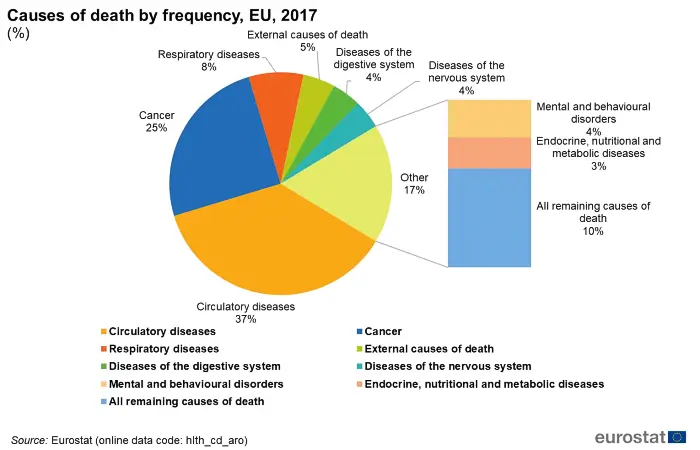
Se ha demostrado que la dieta basada en plantas está asociada a varios resultados beneficiosos para la salud y en las últimas dos décadas ha sido adoptada por una parte cada vez mayor de la población y de los individuos en las sociedades occidentales, especialmente en épocas de enfermedades crónicas como forma de intervención medicinal.
A dieta integral a base de plantas es una dieta congruente con los últimos 50 millones de años de nuestra evolución. Durante 48 millones y pico de años de nuestra evolución, nuestro cuerpo evolucionó alimentándose únicamente de frutas y hojas verdes.
Una dieta integral basada en plantas es una dieta que todos nuestros antepasados homínidos tenían y una dieta que dio forma a toda nuestra fisiología. La entrada de un par de por ciento de calorías procedentes de insectos o de algo de médula ósea no es suficiente para inducir cambios epigenéticos que se traduzcan en una adaptación fisiológica significativa en términos evolutivos.
Incongruente dieta moderna de todo-carne-usted-puede-comer fue reconocido científicamente como una fuente de todos, y me gustaría repetir esto porque sigue siendo un gran problema para la mayoría de la gente a escuchar.
Dieta evolutivamente inadaptada no congruente, es decir, carne y lácteos y alimentos procesados, es la única, además de la contaminación, el suelo empobrecido en nutrientes y algunos otros factores medioambientales, es la fuente principal de la epidemia de todas las enfermedades de la opulencia que tenemos en el mundo moderno.
Por ejemplo, si tienes una enfermedad cardíaca lo primero que harías o deberías hacer es llevar una dieta totalmente vegetal y no tomar un estatina. Lo mismo ocurre con el cáncer o cualquier enfermedad inflamatoria o autoinmune, enfermedad renal crónica, síndrome metabólico o diabetes..... Hoy en día hay un número cada vez mayor de personas que han adoptado una dieta basada en plantas como prevención de enfermedades de la afluencia y especialmente en la última década más o menos influenciado por la creciente disponibilidad de información no censurada proporcionada por científicos independientes y por bases de datos de acceso público como pubmed.gov. Esto es algo que su médico, la medicina alopática y las grandes farmacéuticas no pueden o son incapaces de suprimir.
Sin embargo, todavía hay muchas personas que cambiaron a una dieta vegana como una cuestión moral o filosófica. En este artículo, voy a analizar las deficiencias comunes en lo que respecta a los alimentos integrales a base de plantas o dietas veganas y no cualquier tipo de otras dietas de estilo vegetariano. Una dieta basada en plantas puede ser una dieta que potencialmente puede incluir mariscos (pescetarianismo), huevos (ovovegetarianismo), los productos lácteos (lacto-vegetarianismo), o ambos (ovo-lacto-vegetarianismos). También hay que tener en cuenta que una dieta vegana puede ser un comida basura dieta también. Azúcar es vegano también lo es el aceite refinado.
Sin embargo, el número de personas que realmente siguen una dieta integral basada en plantas sigue siendo casi insignificante en comparación con el resto de la población. Aunque el porcentaje de veganos ha aumentado en la última década de forma espectacular, ha aumentado un 350% en los últimos diez años, todavía hoy sólo ronda el 2% en Norteamérica. En Europa, por ejemplo en Alemania, es sólo del 0,1% al 1% de la población adulta. Otros estudios realizados en países de todo el mundo han arrojado tasas de prevalencia inconstantes en la población general: 0,77% en China, 0,79% en Italia, 1,5% en España, 3,8% en Noruega, 4,1% en Finlandia, hasta 11,2% en Australia y 15,6% en Suecia. El porcentaje más alto en todo el mundo se da en el sur de Asia, donde alrededor del 33% de la población es vegana, y en ello influyen tanto la pobreza como las creencias religiosas.
Dieta vegana
La dieta vegana no incluye productos elaborados a partir de animales y tendría un perfil nutricional muy o completamente diferente del dieta americana estándar. No se trata de una diferencia menor, sino esencial.
En primer lugar, la composición nutricional de macro y micronutrientes sería completamente diferente. Esto podría no ser un gran problema y sería beneficioso para usted si come más carbohidratos complejos y almidón y alimentos densos en nutrientes en lugar de azúcar y grasa.
En segundo lugar, y lo que es más importante, hay algunos nutrientes que sólo se encuentran o se encuentran en cantidades no adecuadas en un tipo de dieta. Hay nutrientes que sólo existen en los productos animales o viceversa. Esto significa que una dieta basada en plantas carecería de nutrientes que se encuentran en los animales o carecería de ellos en cantidades óptimas si los hubiera.
En realidad, se trata de una buena noticia, porque no somos omnívoros desde el punto de vista fisiológico, sino sólo conductual. Por ejemplo, los verdaderos omnívoros y carnívoros no producen su propio colesterol como los que comen plantas.
Para los carnívoros y omnívoros, el colesterol es un nutriente esencial, pero no para nosotros. (Liscum et al., 2008).
Producimos todos colesterol que necesitaríamos durante toda nuestra vida. Cualquier colesterol dietético es un exceso que necesita ser desintoxicado. Así que una dieta basada en plantas, por ejemplo, carecería totalmente de colesterol y en este caso, dado que nuestra principal causa de muerte son las enfermedades cardiacas, sería algo positivo. Un gato carnívoro, por ejemplo, nunca podría desarrollar una enfermedad cardiaca por mucho colesterol que consumiera. Por otro lado, el gato produciría su propia vitamina C en su hígado a diferencia de nosotros que no es una vitamina para ellos ni para ningún carnívoro. Otros ejemplos serían el hierro hemo que sólo se encuentra en la carne. Por otro lado, hay algunos otros nutrientes que sólo se encuentran en los animales que son esenciales y no se encuentran en las plantas y aquí es donde tenemos un problema como por ejemplo vitamina B12 por ejemplo.
Por otro lado, hay nutrientes que sólo se encuentran en las plantas y que faltan por completo en el reino animal, como la ya mencionada vitamina C, y esto es un gran problema para las personas que siguen la dieta americana estándar.
Además de los macronutrientes, las plantas contienen numerosos fitoquímicos (fito significa planta en griego antiguo), y algunos de ellos son esenciales para la vida como los carotenoides, polifenoles y otros antioxidantes.
Los productos animales están totalmente desprovistos de cualquier tipo de antioxidantes y son gravemente proinflamatorias.
Esta es la razón por la que, por ejemplo, una cabra media es capaz de producir hasta 10 gramos de vitamina C en su hígado en un día si el cuerpo sufre algún tipo de estrés y la cabra es un rumiante. Hay miles de fitoquímicos diferentes y todos ellos son bioquímicamente activos en el cuerpo humano. Polifenoles que se encuentra en las uvas, las bayas y los frutos secos, indol-3-carbinol en verduras crucíferas como las coles, la col y la coliflor, isoflavonas se encuentra en las legumbres, incluidos el trébol, la soja y el altramuz, el licopeno en los tomates.... En general, se considera que estas sustancias no tienen ningún valor nutricional añadido por medicina alopática y no se consideran vitaminas, pero tienen diversas vías metabólicas en el organismo, lo que aporta múltiples beneficios para la salud. Su carencia siempre genera enfermedades como la inflamación crónica, que puede derivar en otras enfermedades como el cáncer, por ejemplo. Encontrará más información sobre las deficiencias de la dieta estadounidense estándar en este artículo (Deficiencia de micronutrientes en la dieta estadounidense estándar: Estrategias de optimización).
Sin embargo, si una dieta vegana no se planifica adecuadamente, y esto ocurre sobre todo en personas que siguen una dieta vegana por razones morales, puede aparecer una reducción de la ingesta calórica y una deficiencia nutricional de algunas vitaminas, como la B12, y de algunos minerales. Hay deficiencias comunes que afectan tanto a las dietas basadas en plantas como a las dietas americanas estándar, como el yodo y la vitamina D, por ejemplo, y luego hay deficiencias que sólo afectan a las dietas basadas en plantas debido al veganismo en sí, como la deficiencia de B12.
La Vitamina D
La vitamina D es una carencia frecuente. Afectará a todos los habitantes del planeta que no corren desnudos en pleno día por las sabanas africanas. Si llevas ropa y vives en interiores, tienes deficiencia o insuficiencia de vitamina D. La Vitamina D no es en absoluto una vitamina alimentaria. No tiene nada que ver con la dieta. Podemos obtener cierta cantidad de la dieta pero, en la mayoría de los casos, necesitaremos suplementos. La vitamina D no es una vitamina, sino una hormona esteroide que afecta a más de 2.000 genes de nuestro cuerpo y que se produce cuando exponemos nuestra piel a la luz solar fuerte y sólo fuerte. Tomar el sol cinco tardes no serviría de nada, ni siquiera para las personas de piel pálida. Se trata de una deficiencia común y no específica de una dieta basada en plantas. Dependiendo de tu peso y exposición al sol debe tomar de 4000 a 5000 U.I. diarias.
Yodo
Esta es una deficiencia universal más. La teoría dice que nuestros antepasados homínidos sobrevivieron viviendo cerca de la costa y de los deltas de los ríos, y que comieron muchas verduras del mar en lugar de las verduras normales en las condiciones climáticas secas de África tras el cambio.
Como consecuencia, tenemos una necesidad extraordinaria de yodo.
Tanto es así que es obligatorio añadirlo a la sal. El problema es que la cantidad que se obtendría de la sal es tan minúscula que sólo prevendría la deficiencia flagrante de yodo. Esa cantidad de yodo que consumimos de la sal sólo bastaría para prevenir el bocio flagrante y el cretinismo y nada más. Está muy lejos del nivel óptimo de ingesta de yodo. ¿Y qué pasa si tienes una enfermedad cardiaca o alguna otra afección y tu médico te dice que evites la sal? ¿Y si estás embarazada?
La razón por la que el yodo es deficiente en la mayoría de los veganos y en el resto de la población es que los veganos tienden a comer muchas verduras, pero no comen muchas verduras de hoja verde marina.
Nuestro cuerpo puede contener una reserva de 1500 mg de yodo.
Son miligramos, no microgramos. La dosis diaria recomendada de yodo es de 140 microgramos. Nuestro cuerpo querría tener una reserva de 1.500.000,00 microgramos y tu médico te pide que comas 140 microgramos al día. Es un gran tema que analizaré en algunos de los próximos artículos. La mayoría de los médicos tienen fobia al yodo porque tienen miedo a las demandas y prefieren que sufras a que sepas la verdad y arriesgarse a perder su licencia si algo sale mal. Esa es una razón por la que recomiendan la micro-dosificación de yodo que tiene muy pocos efectos sobre la salud, excepto la prevención de la deficiencia flagrante. Puedes empezar viendo esta conferencia.
Dr. Jorge Flechas - Suficiencia Total de Yodo en el Cuerpo. Medicina Restaurativa, Portland, Oregon Conferencia 2011
Hierro
Los veganos tienen la oportunidad de consumir diariamente tanto hierro como los no veganos, pero como está en la hemoglobina, la gente piensa inconscientemente que si no comen carne tendrán deficiencia de hierro porque creen inconscientemente que están destinados a comer carne porque "los humanos son omnívoros".
Los humanos son omnívoros conductuales, igual que los chimpancés, y no anatómicos reales con más de 50 millones de años con una dieta de vegetales de hoja verde y el hierro es exactamente la prueba de ello.

Debido a que nosotros como primates veganos en nuestra evolución nunca habíamos consumido la forma animal del hierro también conocido como hierro hemo nuestro cuerpo nunca desarrolló ningún mecanismo enzimático para controlar sus niveles. Lo que esto significa es que nuestro cuerpo no tiene un mecanismo de control para eliminarlo o no absorberlo. Este es un punto a favor de dieta paleo personas. El hierro hemo o de tipo animal es más biodisponible porque no hemos desarrollado mecanismos de control para su absorción, no porque sea una forma superior de hierro. Nuestro cuerpo es capaz de controlar estrictamente nuestros niveles de hierro en sangre cuando sólo comemos verduras de hoja verde, pero cuando comemos carne todo ese hierro hemo pasará al torrente sanguíneo aunque no sea necesario.
Y dirás vale más hierro ¿cuál es el problema?
Y hay un gran problema. El exceso de hierro es una sustancia inflamatoria que actúa de la misma manera que cualquier radical libre (Emerit et al., 2001). Su principal objetivo es oxidar y transportar oxígeno en primer lugar. En los últimos años ferroptosis (muerte celular inducida por exceso de hierro) está correlacionada con muchas enfermedades como la muerte celular inducida por inflamación (Yu et al., 2021).
- La ferroptosis está estrechamente relacionada con el metabolismo del hierro y los lípidos y se desencadena por diversas condiciones fisiológicas y estrés patológico en seres humanos y animales.
- La ferroptosis que conecta el estrés oxidativo y la inflamación desempeña un papel clave en la patogénesis de enfermedades cardiovasculares como la aterosclerosis, el ictus, la lesión por isquemia-reperfusión y la insuficiencia cardiaca.
Tener exceso de hierro o niveles de hierro por encima de los niveles mínimos requeridos no es óptimo, es proinflamatorio y la inflamación es correlacionado con una amplia gama de enfermedades, incluido el cáncer.
Nuestro cuerpo también tendrá dificultades para eliminar el exceso de ese hierro hemo animal una vez que se absorbe de forma forzada y antinatural de la carne. A escala poblacional, tanto los niveles de hierro como de ferritina en sangre son más bajos en los veganos que en los no veganos, y esto es algo bueno, no una deficiencia de nutrientes (Pawlak et al., 2016). La mayoría de los nutricionistas y médicos no entienden que tener más hierro es sólo tener más inflamación y que nuestros cuerpos han desarrollado durante millones de años mecanismos que nos permiten no absorber el exceso de hierro de origen vegetal si no es necesario. La absorción de hierro derivado del hemo es significativamente mayor en comparación con la ingesta de hierro no hemo de los alimentos vegetales y que de alguna manera se convierte en un argumento de venta para la propaganda de que somos omnívoros. Hay una solución fácil para esto si crees que necesitas más hierro por alguna razón.
En la mayoría de los casos, anemia no es causada por la deficiencia de hierro, pero esto sería un tema para otro artículo. La anemia en veganos es más probablemente causada por deficiencia de B12 número uno, luego deficiencia de zinc número dos, y sólo entonces deficiencia de hierro número tres (Bachmeyer et al., 2019).
Si tomas una pastilla de vitamina C o comes algún producto que contenga ácido ascórbico (cítricos, fresas, kiwi) aumentarás la absorción de hierro (Teucher et al., 2004), lo que lleva a una incontrolable entrada de hierro en el torrente sanguíneo.
Si tiene un nivel bajo de hierro en la sangre, la cura no es empezar a comer carne o tomar un suplemento de hierro. El hierro como suplemento es óxido de hierro o en otras palabras sólo óxido regular o algún otro tipo de inorgánico. quelado hierro que le recetarán los médicos. No es orgánico, no es bioabsorbible o incluso si engañas a tu cuerpo para que lo absorba mediante quelación, seguiría siendo una fuente de hierro no biodisponible aunque se absorbiera.
Las legumbres, las alubias, los cereales integrales, las verduras de hoja verde oscuro, las frutas, las semillas y los frutos secos pueden utilizarse como fuentes de auténtico hierro orgánico. Evite también los productos enriquecidos con hierro.
El tratamiento consiste en tomar una pastilla de vitamina C o 500mg después de la comida y sólo después de haber normalizado primero sus niveles de zinc y B12 y tener todavía niveles de hierro por debajo del valor normal bajo.
Vea el siguiente vídeo para aprender a extraer hierro de sus cereales matinales.
Zinc
El zinc es otro mineral, además del hierro, que no se absorbe tan fácilmente de las fuentes vegetales como de los productos animales. Los veganos han mostrado la ingesta más baja de zinc en comparación con grupos con diferentes hábitos alimentarios (Bakaloudi et al., 2021). Esto todavía no significa una deficiencia flagrante de zinc, pero es algo consistente en los consumidores de vegetales. Una dieta vegana no es necesariamente deficitaria en zinc, pero puede requerir más atención para garantizar una ingesta y absorción adecuadas de este mineral.
En los veganos, unos niveles bajos de zinc en plasma pueden provocar anemia ferropénica, ya que el zinc actúa como catalizador en el metabolismo del hierro (Kondaiah et al., 2019).
Las carencias de minerales siempre se presentan como un paquete mineral complejo que no se corrige tan fácilmente. En la naturaleza, la alimentación es un paquete.
Los minerales nunca actúan solos, sino como un complejo de sustancias diferentes. Cada mineral tiene minerales opuestos y otros minerales sinérgicos. Además, todos los minerales compiten por su absorción.
Es la forma que tiene la naturaleza de regular el equilibrio mineral. Pero con la capa superficial del suelo erosionada, todo está mal y no se puede corregir tan fácilmente. Para corregir las carencias de minerales, primero hay que comprender la rueda mineral. Es un tema muy amplio. Siempre debe corregirse con alimentos, y no con cualquier alimento, sino con alimentos cultivados en tierra vegetal rica en minerales y sin fertilizantes sintéticos.
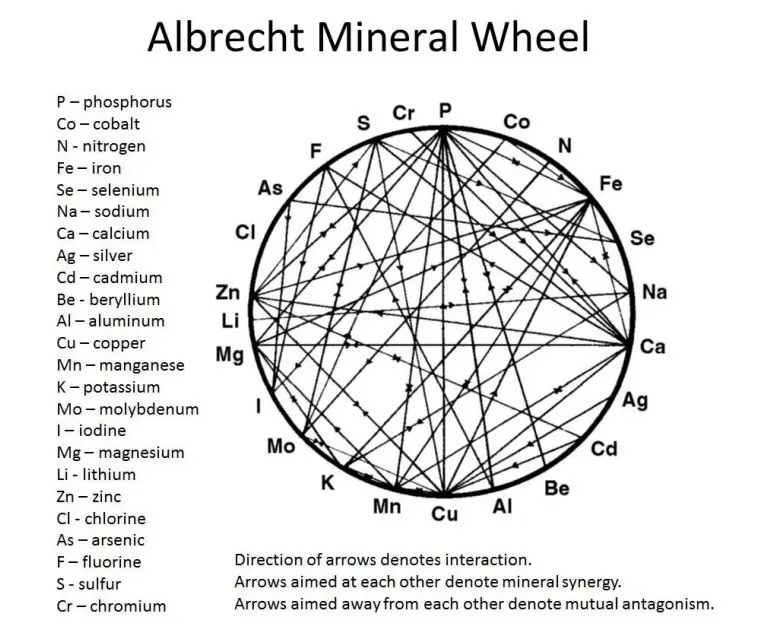
Los alimentos vegetales ricos en zinc son el pan integral, los guisantes, el maíz, las nueces, las zanahorias, los cereales integrales, los gérmenes de trigo, la soja, las coles, los rábanos, los berros y las legumbres. Las semillas de calabaza son buenas y una de las mejores fuentes de zinc. Comer pipas de calabaza para obtener zinc es una solución fácil, sobre todo porque tienen un sabor neutro y se pueden añadir a cualquier muesli o ensalada. En una situación normal, una o dos cucharadas soperas al día bastarían para corregir la carencia de zinc.
Sin embargo, en una situación en la que la carencia de zinc sea más grave, podría ser necesario tomar semillas de calabaza todos los días como régimen. Aunque los suplementos pueden ayudar a corregir deficiencias, el zinc es un metal inorgánico no biodisponible, y es importante recordar que la mejor forma de obtener los minerales que el cuerpo necesita es a través de una dieta equilibrada. Comer una variedad de alimentos ricos en nutrientes le ayudará a asegurarse de que está obteniendo todos los minerales esenciales que su cuerpo necesita. Además, también es importante consumir alimentos cultivados en suelos ricos en minerales, ya que esto ayudará a aumentar el contenido mineral de los alimentos. Comer productos ecológicos es beneficioso, ya que la composición mineral de la capa superficial del suelo no se vería mermada por el uso de fertilizantes sintéticos.
Algunas estrategias para mejorar la ingesta y absorción de zinc en una dieta vegana incluyen:
- Comer una variedad de alimentos ricos en zinc a lo largo del día.
- Remojar, germinar o fermentar legumbres, cereales y semillas para reducir la contenido en fitatos (Saunders y otros, 2013).
- Consumir alimentos ricos en vitamina C con fuentes de zinc para mejorar su absorción.
- Utilizar alimentos enriquecidos o suplementos si no son recomendables o necesarios.
La cantidad diaria recomendada (CDR) de zinc es de 11 mg al día para los hombres y 8 mg para las mujeres. Sin embargo, algunos expertos sugieren que los veganos pueden necesitar hasta un 50% más de zinc que los omnívoros debido a su menor biodisponibilidad (Foster et al., 2013).
Por lo tanto, una ingesta segura y adecuada para los veganos podría ser de 12-16,5 mg al día para los hombres y de 9-12 mg al día para las mujeres.
| Alimentación | Tamaño de la ración | Zinc (mg) | %VD(15 mg) |
|---|---|---|---|
| Semillas de calabaza | 1/4 taza de leche cruda sin sal | 2.75 | 18.33% |
| tofu | 1/2 taza | 2.4 | 16% |
| Lentejas | 1 taza de cocido | 2.3 | 15.33% |
| Semillas de sésamo | 1/4 taza de leche cruda sin sal | 2.16 | 14.4% |
| Arroz salvaje | 1 taza de cocido | 2.1 | 14% |
| Harina de avena | 1 taza de cocido | 2.1 | 14% |
| Anacardos | 1/4 taza de leche cruda sin sal | 1.82 | 12.13% |
| Semillas de chía | 2 cucharadas | 1.7 | 11.33% |
| Semillas de cáñamo | 2 cucharadas | 1.62 | 10.8% |
| Cacahuetes | 1/4 taza de leche cruda sin sal | 1.61 | 10.73% |
| Semillas de girasol | 1/4 taza de leche cruda sin sal | 1.33 | 8.87% |
La proteína
Una de las principales preocupaciones sobre la dieta vegana es la falta de ingesta de proteínas en comparación con la dieta americana estándar. Esto fue desacreditado repetidamente hace más de 50 años y desde el "gran fiasco de las proteínas" se demostró que era falso en la comunidad científica. Todavía hoy la medicina alopática y los medios de comunicación se niegan a hablar de ciencia real y utilizan las proteínas como vaca sagrada de la nutrición sólo para impulsar formas no científicas de agenda y pirámide alimentaria.
Y cuando esto falla hay una segunda línea de defensa llamada la calidad de una proteína o su completitud y el contenido de aminoácidos esenciales.
La tercera línea de defensa se llama eficacia digestiva.
La mayoría de los productos vegetales se caracterizan por su baja digestibilidad. Está bien documentado que la presencia de paredes celulares vegetales y agentes antinutricionales (inhibidores enzimáticos, taninos, fitatos, glucosinolatos, isotiocianatos), así como el procesado de los alimentos y el tratamiento térmico, pueden ser factores inhibidores de la digestibilidad de las proteínas. El único problema es que no necesitamos una ingesta elevada de proteínas en la dieta porque reciclamos todas las proteínas muertas en el organismo. Se trata de un proceso denominado autofagia (que significa autoalimentarse).
Cuando los estudios antropológicos revelaron que los homínidos podían sobrevivir con una media de 15 a 20 gramos de proteínas al día, se asestó el primer golpe al culto de la adoración de las proteínas.
Y algunos de estos homínidos eran más grandes y fuertes que los humanos modernos.
En términos evolutivos, necesidades de proteínas eran mucho más bajos que los identificados por la ciencia moderna. En aquel momento sólo había dos opciones. O bien las necesidades proteínicas señaladas por la ciencia moderna eran totalmente erróneas, o bien las investigaciones en el campo de la antropología sobre las necesidades proteínicas de los homínidos eran totalmente incorrectas.
En la década de 1970, esto condujo al tristemente célebre "Gran Fiasco de las Proteínas" (McLaren y otros, 1974).
Grandes farmacéuticas y medicina alopática no les gustó. Las necesidades humanas de proteínas sufrieron importantes revisiones y reducciones. Ya no se mencionaba el supuesto "déficit mundial de proteínas" (Semba, 2016). Desapareció como si nunca hubiera existido. Las necesidades diarias de proteínas de un lactante, por ejemplo, eran del 13% de las calorías en 1948 y del 5,4% en 1974. Hoy en día, el estadounidense medio puede consumir regularmente más de 90 gramos de proteínas al día.
¿Cuál crees que era nuestra ingesta diaria de proteínas antes de que la tecnología hiciera posible que la gente superara los 40 paralelos?
La respuesta corta es entre 15 y 20 gramos cada día. Y toda la proteína, o al menos el 97% de ella, procedía de plantas, con sólo alrededor del 3% procedente de animales.
Según las investigaciones antropológicas, la proteína nunca se ingirió en las mismas cantidades que hoy durante la mayor parte de la evolución de los homínidos. Y hay una sencilla razón, nuestros antepasados no tenían lanzas ni trampas ni fuego ni ninguna otra tecnología. Sólo los humanos anatómicamente modernos han empezado a utilizar arcos y flechas, lanzas y trampas para cazar. Homo Erectus no lo hizo.
Además, todas las especies de homínidos y todos los primates eran veganos. Entonces, ¿cómo podemos sobrevivir con fuentes de proteínas de baja calidad y escasa cantidad? Como en la naturaleza hay escasez, nuestro cuerpo ha evolucionado para conservar todo lo que se puede conservar.
Nuestro cuerpo ahorra proteínas. Es el proceso de autofagia.
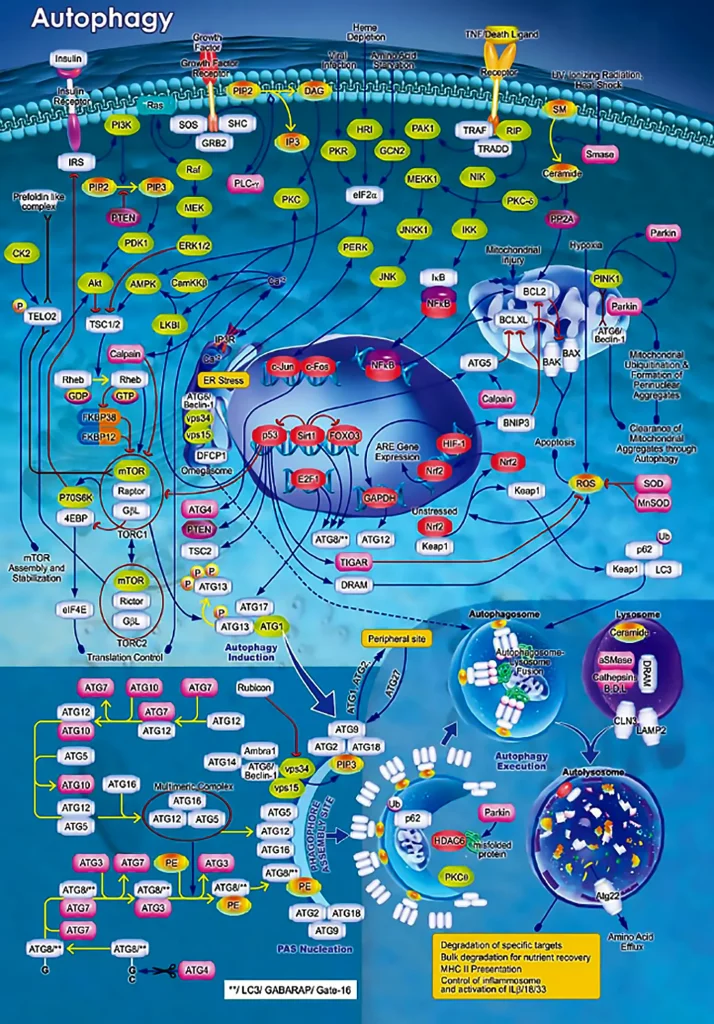
Esto significa que te comes a ti mismo todos los días. Auto significa uno mismo, mientras que phagy significa comer. Todos los días nos comemos a nosotros mismos. Todas y cada una de las células de nuestro cuerpo están compuestas de proteínas, y cuando una célula muere, se recicla. Y se trata de un reciclaje real que es 100% eficaz. Las únicas células que perdemos físicamente son las que no se pueden reciclar, como el pelo, las uñas y la piel, que literalmente se desprenden físicamente de nuestro cuerpo. Todo lo demás se recicla.
Las proteínas no son necesarias para la vida. Las proteínas se reciclan. La proteína que se ha perdido de nuestro cuerpo en forma de piel, pelo y uñas muertas tiene que reponerse. Se trata de unos pocos gramos al día.
Milos Pokimica
Esa es la verdad.
Una de tantas es, por ejemplo, la epidemia de cáncer. Cuando consumimos una dieta rica en proteínas, los niveles de aminoácidos que circulan por nuestro torrente sanguíneo se elevan constantemente. Entonces nuestro cuerpo empieza a liberar la hormona IGF-1 en el torrente sanguíneo. Esa es una hormona que da una señal a las células para que se reparen y se dividan si lo necesitan. La célula normal no hará nada, pero la célula cancerosa hará mucho. Existe una mayor correlación entre el nivel de IGF-1 y la progresión del cáncer que entre el tabaquismo y el cáncer de pulmón.
El segundo efecto del consumo excesivo de proteínas es la parada instantánea y completa de la autofagia. Nuestro cuerpo evolucionó para preservar la energía porque, para la mayoría de la vida en este planeta, la comida no es una opción, y el hambre y la muerte son las formas normales de existencia. Esto significa que si hay mutaciones precancerosas o cualquier tipo de daño en nuestras células no van a ser instruidas para ir a la muerte celular, siempre y cuando no haya inanición. Nuestro cuerpo las va a mantener vivas esperando la próxima sequía para utilizarlas como fuente de energía. Piénsalo de esta manera. Si hay inanición y algunas células deben ir primero en la línea están dañadas las células precancerosas. Por otro lado, la ausencia total de cualquier forma de inanición en el modo de vida moderno con la sobrealimentación constante de fuentes de alimentos ricos en proteínas no es congruente con la inanición y la escasez del entorno de nuestros antepasados. La mala adaptación con el tiempo creará un aumento de todas las formas de enfermedades correlacionadas con la opulencia. El cáncer es una de ellas.
Esto también significa que incluso si usted come una dieta integral a base de plantas tendrá que incorporar ayuno intermitente para cosechar todos los beneficios.
Además, esto significa que consumir demasiadas proteínas vegetales también, por ejemplo, el consumo excesivo de legumbres especialmente el consumo de soja, anulará algunos de los beneficios que una dieta vegana tiene en la prevención del cáncer y la longevidad.
Unos niveles elevados de IGF-1 acortarán significativamente la esperanza de vida, no sólo por el cáncer, sino también por los trastornos metabólicos y el envejecimiento acelerado (Kubo et al., 2022). Ten esto en cuenta si quieres aprovechar todos los beneficios para la salud de la alimentación basada en plantas la próxima vez que alguien o tu médico te pregunten de dónde has sacado las proteínas.
Incluso en la medicina alopática hay consenso en que, en general, si se consumen ciertos alimentos vegetales en combinaciones adecuadas, pueden proporcionar todos los aminoácidos esenciales para la nutrición humana, aunque algunos de ellos pueden estar ausentes en ciertas plantas, incluyendo por ejemplo la lisina en los cereales, el arroz y el maíz, y la metionina en las legumbres. Incluso la medicina alopática está de acuerdo en que si consumimos cualquier alimento completo, ya sean patatas, maíz, arroz o zanahorias, y tomamos suficientes calorías de ese alimento completo para mantenernos sin consumir calorías vacías como azúcar o aceite, obtendremos suficientes aminoácidos esenciales en la dieta. Esto se refiere únicamente a los alimentos integrales, no a los zumos de verduras. Por otro lado, un nivel elevado y constante de proteínas en la dieta tiene graves consecuencias para la salud, sobre las que se puede leer con más detalle en artículos relacionados. leer más en detalle en artículos correlacionados.
Calcio
La ingesta de calcio en la mayoría de los veganos estaba por debajo de las recomendaciones (750 mg/día). Esto es preocupante para las personas que creen que los lácteos son la principal fuente de calcio en la dieta occidental y que sin lácteos debe haber una deficiencia de calcio. Y esto no es correcto.
La mayoría de la población humana es lactosa intolerante.
La tolerancia a la lactosa apareció por primera vez en torno al 2700 a.C. en algunas zonas de Europa centrooriental y luego empezó a extenderse. Existen abundantes fuentes vegetales de calcio. La preocupación surgió debido a que la biodisponibilidad del calcio es inversamente proporcional a las cantidades de oxalato y, en menor medida, al fitato y la fibra presentes en los vegetales. Entre los alimentos ricos en calcio se encuentran las verduras de hoja verde, las semillas de sésamo, las semillas de amapola, el tofu, el tahini... Los alimentos enriquecidos como los cereales, la soja, el arroz, las bebidas de almendra y coco, los zumos de naranja y manzana no son buenas fuentes de calcio porque, en primer lugar, sólo el calcio orgánico es biodisponible e incluso bioabsorbible desde el intestino. El calcio quelado es bioabsorbible porque engañaremos a nuestro cuerpo para que lo introduzca con el agente quelado, pero una vez en el torrente sanguíneo seguirá sin ser biodisponible para los procesos bioquímicos.
Sólo el calcio orgánico es realmente biodisponible para las células de nuestro organismo.
No obstante, la mejor absorción y utilización del calcio la proporcionan los niveles bajos deoxalato verduras, como el brécol, la col rizada, los grelos, la col china, el bok choy, y semillas como las de sésamo y amapola. Por 100 gramos de semillas de sésamo crudas, tendremos 975 miligramos de calcio. Por 100 gramos de semillas de amapola crudas, tendremos 1438 miligramos de calcio. Un litro de la leche tiene 1250 mg de calcio.
La mayoría de la gente teme la pérdida de calcio debido a la osteoporosis. Hay que tener en cuenta que las mujeres africanas no padecen osteoporosis con 350 mg de calcio al día. La osteoporosis afecta más a los países reyes de la leche.
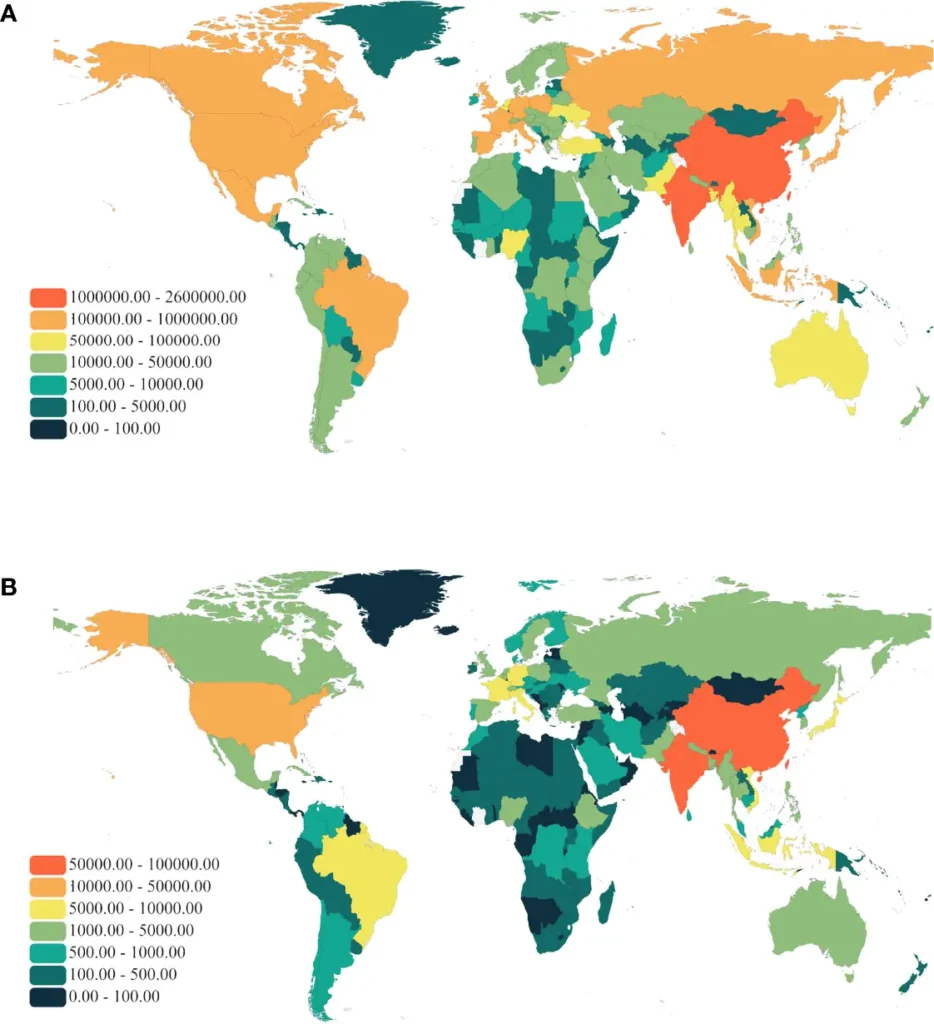
La osteoporosis no es una enfermedad por déficit de calcio. Como se puede ver en el mapa. Los africanos son en un 99% intolerantes a la lactosa. Lo mismo ocurre con los nativos americanos. En India y China, tienen un gran problema con la contaminación por metales pesados y especialmente con metales que causan el debilitamiento de las estructuras óseas como el cadmio y el plomo.
La osteoporosis es una enfermedad crónica por carencia de vitamina D. E incluso esto no es del todo cierto. Si tienes deficiencia de vitamina D durante toda tu vida y luego cuando cumples 60 empiezas a sufrir desmineralización ósea en la mayoría de los casos ya es demasiado tarde.
La razón por la que la osteoporosis es más frecuente en los países más desarrollados y no en los países pobres en las personas intolerantes a la lactosa es que esas personas comen muchas más verduras.
En la mayoría de los casos, la osteoporosis en los países occidentales es consecuencia de una carencia de magnesio, no de calcio.
El magnesio es una de las deficiencias más comunes y prevalentes en las dietas no veganas, ya que el magnesio se encuentra sobre todo en los alimentos vegetales. La diferencia entre clorofila y hemoglobina es sólo en el portador de oxígeno. En la hemoglobina, es el hierro en la clorofila es el magnesio. La molécula es la misma sólo el portador mineral es diferente.
El problema para el consumidor medio de carne es que el magnesio es necesario para más de 300 enzimas del cuerpo humano y una de esas enzimas es la que regula el metabolismo del calcio. La carencia de magnesio y, en cierta medida, de vitamina D, son las fuentes de la aparición de la osteoporosis en las dietas occidentales dominadas por los lácteos.
Milos Pokimica
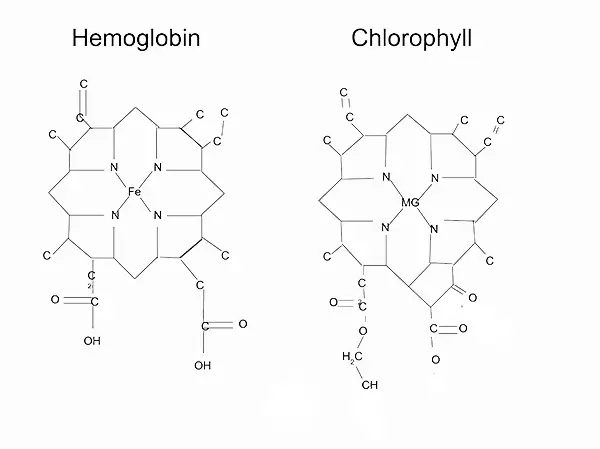
OMS hasta el día de hoy tiene recomendaciones más sensatas que están diseñadas para los hábitos dietéticos de la población mundial más que para los hábitos dietéticos de sólo América y Europa. La OMS recomienda entre 400 y 500 miligramos de calcio como cantidad óptima al día. Por el contrario, EE.UU. tiene una recomendación, la más alta del mundo, de no menos de 1.000 mg de calcio al día. Idealmente 1250mg para adolescentes. La mayoría de los estudios han demostrado que unos 500mg son suficientes para unos huesos sanos. Si consume entre 800 y 900, ya está entrando en la zona de toxicidad del calcio.
Demasiado calcio conduce a demasiado poco magnesio porque, en la rueda mineral, el magnesio y el calcio son minerales opuestos.
Puede elegir su autoridad en calcio, pero mi sugerencia es que no supere los 1.000 mg de calcio procedente únicamente de alimentos integrales.
Nunca consuma alimentos enriquecidos con calcio ni tome calcio como suplemento, ya que los picos de calcio en el torrente sanguíneo pueden provocar calcificaciones en las arterias y coagular la sangre, lo que puede provocar trombosis cálcica (Peng et al., 2021).
Peng et al. (2021), examinó los riesgos de los individuos con una puntuación de calcio en las arterias coronarias (CAC) muy alta (≥1000) en comparación con los que tenían una puntuación de CAC más baja o ninguna. En el estudio se utilizaron datos de MESA (Estudio multiétnico de la aterosclerosis), una cohorte prospectiva, observacional y comunitaria de 6.814 individuos de diversas etnias que no padecían enfermedades cardiovasculares conocidas. Las principales conclusiones del estudio fueron:
- En comparación con CAC 0 y CAC 400 a 999, CAC ≥1000 se asoció con un mayor riesgo de todos los eventos de enfermedad cardiovascular, todos los eventos de enfermedad coronaria, eventos de enfermedad coronaria dura y mortalidad por todas las causas.
- En comparación con CAC 0 y CAC 400 a 999, CAC ≥1000 también se asoció con un mayor riesgo de sufrir un primer episodio de enfermedad no cardiovascular.
- Un CAC ≥1000 correspondía a una tasa anualizada de 3 eventos cardiovasculares adversos mayores de 3,4 por 100 personas-año.
El artículo concluye que los individuos con puntuaciones de CAC muy elevadas tienen una gran carga de aterosclerosis subclínica y presentan un mayor riesgo de resultados cardiovasculares y no cardiovasculares.
Mi sugerencia es que nunca bebas leche vegana enriquecida con calcio y, si las tomas, nunca bebas más de una taza de una sola vez. La leche de soja o de almendras enriquecida con calcio es básicamente un suplemento de calcio.
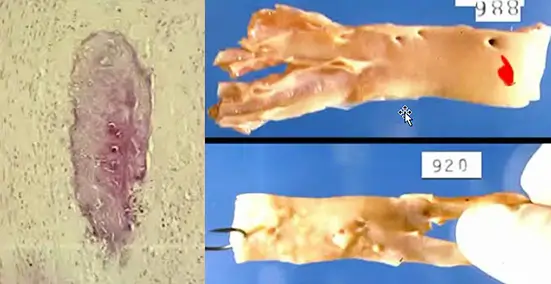
| Alimentos (100 gramos) | Calcio (mg) | % VD |
|---|---|---|
| Semillas de amapola | 1448 | 145 |
| Semillas de sésamo | 975 | 98 |
| Tahini | 426 | 43 |
| Espinacas | 99 | 10 |
| Col rizada | 150 | 15 |
| Tofu (preparado con calcio) | 350 | 35 |
| Soja | 277 | 28 |
| Higos (secos) | 162 | 16 |
| Bok choy | 105 | 11 |
| Almendras | 264 | 26 |
Vitamina K2
En los últimos años la gente de la dieta paleo se las arregló para encontrar un nuevo ingrediente "clave" además de la proteína para actuar como un santo graznido de la propaganda de "somos la especie omnívora". Se trata de la vitamina K2, que sólo se encuentra en los productos animales. Como tal, debe ser la prueba de que no estamos anatómicamente diseñados para comer una dieta basada en plantas. Pues se equivoca. La vitamina K2 en realidad no es una vitamina. Lo siento.
La vitamina K1 es una vitamina real, pero la K2 no lo es.
La vitamina se clasifica como vitamina porque nuestro cuerpo necesita obtenerla de la dieta y es incapaz de fabricarla por nosotros mismos. La vitamina C es una vitamina para nosotros, pero no para ninguna especie carnívora de este planeta, ya que ellos producen su propia vitamina C, por lo que no es una vitamina. El colesterol es una vitamina para ellos, pero tampoco lo es para nosotros. El hígado humano, a diferencia del hígado de las especies omnívoras y carnívoras, produce colesterol. Por lo tanto, el colesterol no es un nutriente para ningún vegetal. Lo mismo ocurre con la creatina. Nosotros la producimos. Y lo mismo con la K2.
Nuestro cuerpo fabrica K2 a partir de la vitamina K1, que se encuentra en las plantas.
El principal argumento de venta aquí es que los niveles más altos de K2 estaban relacionados con la reducción del riesgo cardiovascular, pero sólo si hacemos caso omiso de todo el colesterol y los factores de riesgo. inflamación que conlleva el consumo de carne. Si desea aumentar sus niveles de K2 independientemente de K1 entonces usted puede simplemente comer algunos natto que es soja fermentada y muy rica en K2 o algunas otras verduras fermentadas como chucrut. En Serbia y en la mayoría de los países eslavos, el chucrut se elabora y consume tradicionalmente durante el invierno en la mayoría de los hogares, pero no es una fuente tan importante de K2 como el kimchi o el natto. En los países occidentales es más popular el kimchi coreano, y se puede empezar a incorporar kimchi en la dieta si esto de la K2 te molesta mucho. Las verduras fermentadas también son una de las mejores fuentes de bacterias probióticas, pero tendrás que prepararlas tú mismo. Si encuentras verduras fermentadas en la tienda, cualquier tienda, supermercado o mercado de agricultores, todas las verduras fermentadas tienen que estar pasteurizadas por ley antes de poder venderse. No habrá bacterias vivas en ellos, así que si quieres bacterias probióticas y K2 tendrás que aprender a fermentarlos tú mismo.
| Alimentos (100 gramos) | Vitamina K2 (mcg) | % VD |
|---|---|---|
| Natto | 1103 | 919 |
| Kimchi | 65 | 54 |
| Chucrut | 4.8 | 4 |
| Tempeh | 3.5 | 3 |
| Kombucha | 0.5 | <1 |
| Miso | 10 | 8 |
| Queso vegano (a base de frutos secos fermentados) | 8.5 | 7 |
| Pepinillos | 4.5 | 4 |
| Yogur vegano (de soja o coco fermentado) | 3.5 | 3 |
| Kéfir vegano (de granos o frutos secos fermentados) | 3.2 | 3 |
| Gotas veganas de vitamina K2 (elaboradas a partir de natto fermentado) | 1000 por gota | 833 |
Este es el kimchi de col napa clásico, picante y tradicional llamado tongbaechu-kimchi, también conocido como baechu-kimchi, o pogi-kimchi. Pero este plato es tan común que la mayoría de los coreanos lo llaman simplemente "kimchi". Cuando la gente habla de kimchi, ¡se refieren a este plato!
Vitamina B12
La gente puede ver fácilmente cómo un cambio en nuestro modo de vida ha contribuido a la insuficiencia persistente y generalizada de vitamina D que afecta a la mayoría de la población. Hemos abandonado las condiciones climáticas cálidas de África, donde hemos evolucionado durante 50 millones de años, y ahora nos encontramos en el clima frío del hemisferio norte, donde no hay sol. Vivimos en interiores y utilizamos ropa para mantenernos calientes.
Sin embargo, ¿qué ocurre con la vitamina B12?
Me lo preguntan con frecuencia. Si estamos predispuestos evolutivamente a ser herbívoros, ¿cómo es que la B12 se encuentra exclusivamente en productos animales y no en alimentos vegetales?
Esto tiene una fácil explicación. Esta vitamina es producida por un tipo concreto de bacterias, no por plantas ni animales.
Tenemos ese tipo de bacterias en el colon y producimos B12, pero hay un problema que impide que la B12 funcione como vitamina para nosotros. B12 no está disponible para su absorción, ya que se genera por debajo de la íleonque es donde se absorbe la B12. Sin embargo, la B12 se excreta en lugar de absorberse. En términos evolutivos, el problema no es una dieta vegana, sino un aumento del saneamiento. En circunstancias normales, no podríamos lavarnos las manos y beberíamos agua contaminada. Por ejemplo, los chimpancés se tocaban los desechos antes de comer fruta con la misma mano.
Esto les permite obtener B12 mientras siguen una dieta basada en plantas. Como nosotros ya no hacemos eso y tenemos saneamiento, no consumimos suficiente cantidad de esa vitamina. Tampoco contraemos el cólera.
Un entorno evolutivamente incongruente con el agua limpia, más que una dieta incongruente, es el culpable de la deficiencia de B12 en los veganos.
En un par de estudios realizados sobre el tema de la deficiencia de B12, casi la mitad de los veganos tenían deficiencias graves y 20% tenían niveles bajos. No toman pastillas de B12, lo que explica este resultado. Debes tomar B12 si eres vegano. Incluso los vegetarianos sólo tienen una suficiencia del 76% (Gilsing et al., 2010).
La B12 es una vitamina crucial para numerosos procesos del organismo, en particular para el desarrollo de los glóbulos rojos y la salud del sistema nervioso y el cerebro. La anemia es uno de los resultados de la deficiencia de B12, y la mayoría de las veces no se trata de una deficiencia de hierro, como creen la mayoría de los veganos. Además, unos niveles adecuados de La vitamina B12 ralentiza el deterioro cognitivo en el envejecimiento. Alrededor de 1 de cada 5 personas mayores de 70 años sufre deterioro cognitivo sin demencia, que evoluciona hasta el 12%, que padece demencia en toda regla y muere. La pérdida de células cerebrales relacionada con la edad se denomina deterioro cognitivo. Hasta cierto punto, esto es "normal". Es un tipo de estrategia preventiva para Enfermedad de Alzheimer en lugar de una cura completa.
Esto se debe a que La vitamina B12 es crucial para regular los niveles de homocisteína en el cerebro.. B12, folato y B6 son las tres vitaminas que regulan los niveles de homocisteína. La mayoría de los no veganos consumen cantidades adecuadas de B12 y B6, pero no suficiente folato. Por el contrario, la mayoría de los veganos consumen más folato pero, sin suplementos, no tienen B12 en absoluto y esto hará que los niveles de homocisteína se disparen, los niveles de riesgo de accidente cerebrovascular se disparen y el cerebro se convierta en papilla se dispare.

La mayoría de los consumidores de carne tienen homocisteína niveles de alrededor de 11 porque no consumen suficiente folatoLa homocisteína, que se encuentra sobre todo en las verduras de hoja verde y las judías, y consumen demasiada metionina. En Estados Unidos, más del 96% de los individuos no consumen ni la más mínima cantidad de verduras de hoja verde y alubias, lo que les deja con un nivel de homocisteína de 11 µmol/L.
Además, la mayor parte de la metionina se encuentra en las proteínas animales. Es un aminoácido esencial para los humanos y la homocisteína es un subproducto del metabolismo de la metionina. Sin embargo, cuando observamos a los veganos a largo plazo, sus niveles de homocisteína son horrendos.
En este estudio (Obersby et al., 2013), los niveles de homocisteína eran de 16,41 en los veganos, 13,91 en los vegetarianos y 11,0 en los omnívoros. No obstante, los veganos pueden beneficiarse plenamente de su dieta si toman suplementos de B12. Así, sus niveles de homocisteína descenderán por debajo de 5.
La mayoría de las personas no miden activamente sus niveles de homocisteína o no están familiarizadas con el tema. Sin embargo, se trata de una afección mortal que, si no se trata, puede convertirse en una importante enfermedad crónica con efectos a largo plazo.
Los niveles elevados de homocisteína son una de esas afecciones que serán subclínicas y, cuando aparezcan los primeros síntomas, ya será demasiado tarde. El daño ya está hecho.
Mi recomendación es que tome su B12. Además, la relación riesgo-beneficio en más la regulación a la baja de los niveles de homocisteína favorece a la creatina como suplemento de longevidad. Creatina también puede ayudarte a hacer ejercicio.
Creatina
Es posible que oiga hablar de la creatina como suplemento para el culturismo o el deporte en general. No es una vitamina porque nuestro propio cuerpo la produce. No necesitamos tomar suplementos ni tomarla. No es esencial y sólo se encuentra en la carne. Así que los veganos tendrán niveles más bajos que los carnívoros. También por esta misma razón, la suplementación adicional para los consumidores de carne tendrá mucho menos de un beneficio adicional que para los comedores de plantas porque las personas que consumen carne ya consumen mucho más creatina de lo normal y son hasta cierto punto saturado. El cuerpo tiene un nivel de saturación. Cuando se alcanza, la creatina adicional se expulsa a través de los riñones. En el culturismo, cuando se empieza a suplementar con creatina, primero se realiza una fase de carga para saturar rápidamente el organismo y después se pasa a una fase de mantenimiento con no más de 5 gramos de creatina al día. Para algunas personas, la suplementación con creatina no hará nada. Son los llamados no respondedores. Y se trata de personas que ya consumen demasiada creatina procedente de la carne. Pero para los veganos, la situación es diferente. Una dieta basada en plantas está completamente desprovista de creatina y en los veganos, la creatina se produce sólo internamente.
Una dieta basada en plantas está completamente desprovista de creatina y en los veganos, la creatina sólo se produce internamente.
El problema con la creatina es que cuando nuestro cuerpo la produce, también se crea homocisteína como subproducto.
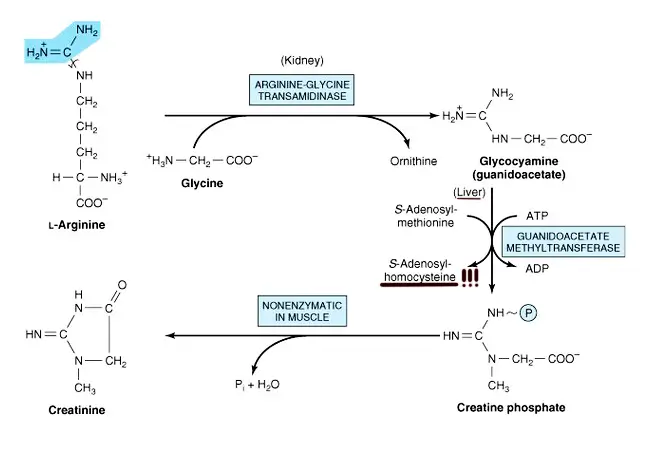
El razonamiento es que si tomamos creatina como suplemento reduciremos la necesidad de nuestro cuerpo de producirla internamente y, como consecuencia, tendremos niveles más bajos de homocisteína.
En este estudio (Van Bavel y otros, 2019), se examinó a individuos que sólo consumen una dieta basada en plantas y que no toman suplementos de vitamina B12. Presentaban los niveles de homocisteína más elevados posibles. Incluso se observaron niveles superiores a 50 en algunos sujetos.
No recibieron suplementos de B12, sólo creatina. Sus niveles disminuyeron gradualmente y alcanzaron un nivel normal de aproximadamente 10. Esto es sólo suplemento de creatina por sí mismo. La B12 adicional hará que este nivel sea mucho más bajo. Actualmente, no he podido encontrar ningún estudio sobre este tema en particular, por lo que ofrezco este consejo a cualquiera que quiera escribir su tesis doctoral: busquen veganos que no tomen suplementos de B12, y luego denles tanto B12 como creatina y midan sus niveles de homocisteína.
Ácidos grasos omega-3
El DHA es otra sustancia importante para prevenir el deterioro cognitivo. DHA significa ácido docosahexaenoico y EPA significa ácido eicosapentaenoico. Ambos son ácidos grasos omega-3. Y ambos sólo se encuentran en los productos animales. El ácido graso omega-3 de origen vegetal es ácido alfa-linolénico (ALA), which the body will convert to EPA and DHA.
El DHA desempeña un papel clave en el desarrollo de los tejidos oculares y nerviosos (Lafuente y otros, 2021). El DHA también podría reducir el riesgo de enfermedades cardiacas y circulatorias al disminuir el grosor de la sangre, reducir la hinchazón (inflamación) y disminuir los niveles sanguíneos de triglicéridos (Holub, 2009).
En algunas investigaciones la sangre viscosidad de las personas que vivían en el círculo polar ártico era tan bajo que sus heridas no cicatrizaban y la hemorragia de un pequeño corte duraba más de 20 minutos debido a todo el DHA que consumían en exceso. Estaban en riesgo por la fisiopatología cardiaca. La combinación de hipoxia tisular y la reducción de la viscosidad sanguínea provoca una disminución de la resistencia vascular. El organismo responde a la disminución de la resistencia vascular sistémica aumentando la retención de sodio y agua, lo que se traduce en un aumento del volumen sistólico y del gasto cardíaco.
Por otro lado, la dieta americana estándar no proporciona la cantidad adecuada. Tendrá que consumir algún tipo de ácido graso omega-3. Si no come pescado que es el número uno más tóxico carne en existencia y el número dos de carne pro-inflamatoria después de pollo entonces usted tendrá que encontrar una fuente de ALA. Usted puede complementar con aceite de pescado, pero el pescado es extremadamente contaminado con no sólo mercurio pero PCP-s, DDTy todos los demás contaminantes orgánicos persistentes. El problema era que los consumidores empezaban a ser conscientes de estos contaminantes. Entonces la industria intentó limpiar este aceite ofreciendo un aceite de pescado molecularmente destinado con la afirmación de que está libre de contaminación, pero cuando se probó de forma independiente se demostró que era marginalmente más limpio y esto puede ser motivo de una demanda contra la industria.
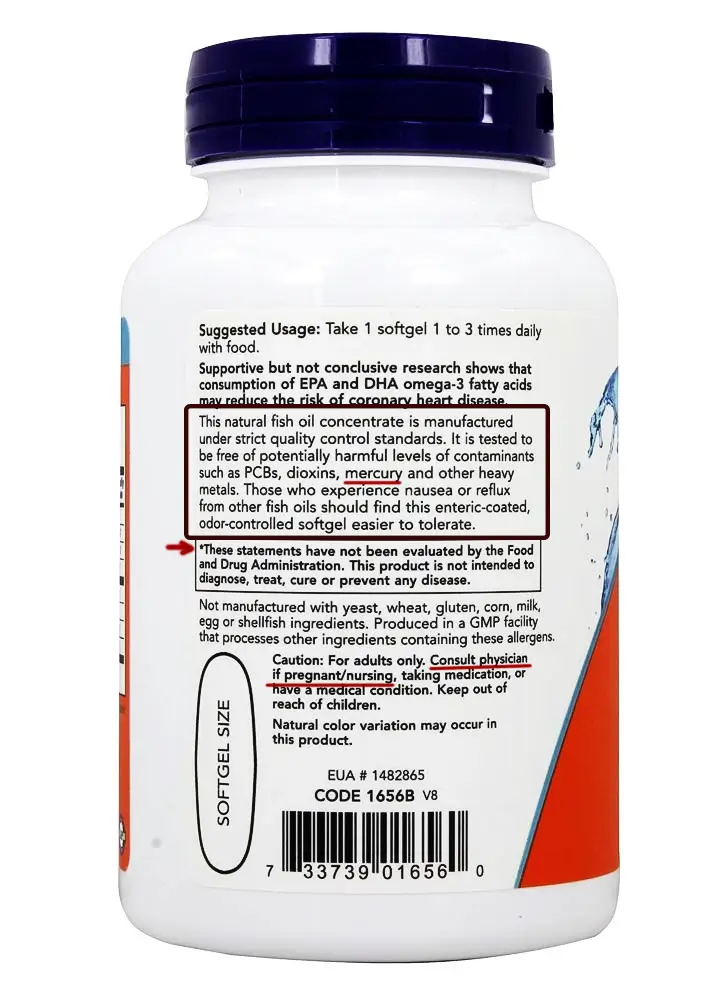
Entonces intentaron ofrecer un aceite omega 3 de especies que están más abajo en la cadena alimenticia como el aceite omega 3 de krill que ha sido probado ser más puro que el aceite de pescado e incluso más puro que el aceite de pescado molecularmente destinado. Pero entonces surge de nuevo la pregunta.
¿Por qué no baja hasta el fondo de la cadena alimentaria y se limita a tomar un suplemento de DHA a base de algas? Para empezar, los peces y las gambas obtienen su omega-3 de las algas.
Otra opción será simplemente comer una cucharada de semillas de lino recién molidas al día.
Y esto si no consumes refinados aceites poliinsaturados como el aceite de girasol. Si usas aceites vegetales entonces necesitarías tomar más ALAs o ir a la raíz suplementaria. El problema es la conversión. No es natural consumir aceite en forma refinada.
La enzima que convierte el ALA en EPA y DHA, la delta-6-desaturasa (D6D), también se une a los ácidos grasos poliinsaturados. Su afinidad por el ALA es unas seis veces mayor (Gerster, 1998) pero si hay mucho aceite poliinsaturado en el torrente sanguíneo, sobresaturará las vías enzimáticas del organismo.
Esa es la razón por la que verá una tasa diferente de conversión de ALA en diferentes individuos. Todo lo que se dice sobre la proporción de omega 3 y omega 6 se debe a que la enzima se unirá a ambos y esto es un problema cuando introducimos aceite refinado de omega 6 en la dieta. De media, entre el 1 y el 10% del ALA se convierte en EPA y entre el 0,5 y el 5% en DHA. Eso es 10 veces la diferencia en individuos y todo por culpa del aceite refinado.
Necesitamos entre 300 mg y un gramo de DHA al día. A una tasa de conversión del 0,5%, necesitaremos consumir de 6000mg a 20000mg de ALA. Para consumir 20 gramos de aceite de omega 3 será necesario consumir alrededor de 50 gramos de semillas de lino molidas al día. Esto representará también un número significativo de calorías. Esto es para una conversión del 0,5%. Para una conversión del 5%, serán 5 gramos de semillas de lino al día para 1 gramo de DHA. Para una RDA mínima de 300mg, necesitaremos 10 gramos de linaza para el extremo alto o de 1 a dos gramos para el extremo bajo. Y todo esto es muy confuso.
El rango va de 2 gramos a 50 gramos de lino al día. Tal vez un poco de pudín de chía con algunas nueces y tal vez algún suplemento de DHA a base de algas si tienes dinero. Deberías incorporar las semillas de lino a la dieta por su lignano independientemente del contenido de omega 3. Los lignanos tienen un efecto positivo en los perfiles lipídicos de los pacientes con dislipidemia-enfermedades relacionadas. La ingesta dietética de lignanos también se asocia a un menor riesgo de cáncer y enfermedades cardiovasculares y a una menor inflamación. Pero aquí hay un gran pero.
El ALA es el aceite más sensible a la oxidación de todos los aceites existentes.
En cuanto se expone al oxígeno del aire, se oxida y se vuelve rancio. Nunca, bajo ninguna circunstancia, consuma aceite de linaza o cualquier otro aceite rico en omega-3. Nunca compre o consuma semillas de lino o cualquier otra semilla rica en omega-3 pre-molidas.
Si quieres comer linaza tritúralas para ti. Tampoco demasiado, y utilícelas inmediatamente. No las añada a las licuadoras si no son de las que licúan al vacío. Tritúrelas lo mínimo necesario y consúmalas inmediatamente. No los guarde en la nevera para más tarde. Cómalos inmediatamente o tírelos a la basura.
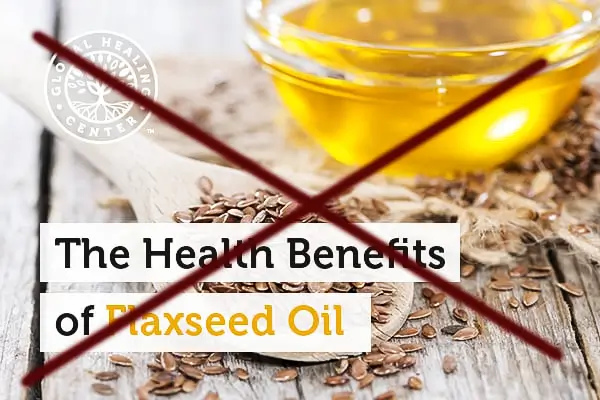
Vitamina E
Incluso con una dieta basada en alimentos vegetales integrales, la vitamina E es extremadamente difícil de obtener en cantidades adecuadas. Se trata de una de las carencias universales. Lo más probable es que la mayoría de nosotros que no intentamos activamente solucionar la carencia de vitamina E acabemos teniendo un consumo insuficiente. En realidad, la vitamina conocida con el nombre de vitamina E es sólo uno de un grupo de ocho compuestos. Todos ellos son antioxidantes liposolubles: cuatro isoformas de tocoferol (α-, β-, γ- y δ-tocoferol) y cuatro isoformas de tocotrienol (α-, β-, γ- y δ-tocotrienol). Sólo una forma, el α-tocoferol, está clasificada como vitamina E. No obstante, los demás tocoferoles también tienen acciones biológicas en el cuerpo humano.
Como el aceite y el agua no se mezclan, nuestro cuerpo necesita vitamina C para el agua y vitamina E para las partes grasas de nuestras células como defensa contra los radicales libres. Los órganos compuestos de grasa, como el cerebro, son especialmente susceptibles a la inflamación provocada por la escasez de vitamina E.
Esta es una de las deficiencias que permanecerá sin detectarse durante mucho tiempo creando daños en el ADN antes de manifestarse como un enfermedad crónica. En ese momento, el daño ya está hecho.
La vitamina E es un antioxidante liposoluble que sólo se encuentra en las grasas.
Por lo tanto, el único alimento que lo tendrá será aquel que almacene energía en forma de grasa. En este caso, predominan los frutos secos y las semillas. Además, como la vitamina E es un antioxidante, si se expone al aire se oxida y el aceite se vuelve rancio. La principal fuente de vitamina E en la dieta occidental es precisamente el aceite vegetal. Esto es una gran mentira diseñada para engañarle.
La vitamina E es muy difícil de obtener porque, como antioxidante liposoluble, sólo existe en la grasa. Y como es un antioxidante, reacciona con el oxígeno del aire, así que si tenemos algo de vitamina E expuesta al aire, desaparece. El aceite está rancio. Fin de la historia.
La principal fuente de vitamina E en la dieta occidental es precisamente el aceite vegetal. Es una gran mentira diseñada para engañarle. Las etiquetas nutricionales enumerarán la vitamina E del aceite rancio como una fuente fiable en la dieta. Esto también se aplica a las semillas molidas.
Aunque utilice un extracción casera de aceite para obtener aceite fresco, en cuanto se extrae el aceite, el contenido de vitamina E se reduce drásticamente. Debe consumirlo inmediatamente. Esto también se aplica si muele sus propias semillas, utiliza una licuadora o realiza cualquier otro método para exponer la vitamina E y otros antioxidantes al aire.
¿Y qué hace la mayoría de la gente con el petróleo?
Se utiliza para freír, cocinar y hornear. El calor acelera la oxidación, así que despídete de cualquier contenido de vitamina E cuando utilices aceite en la cocina. Tienes aceite rancio que es proinflamatorio, cancerígeno y mutagénico, y lo que sea que uses para freír en él también es cancerígeno. Porque tiene un punto de humeo mayor que grasa poliinsaturadaLa grasa saturada es más estable cuando se fríe. Los aceites vegetales sólo figuran como fuente de vitamina E en las estadísticas en papel. Si sabes algo de nutrición sabrás que esto es mentira. En realidad se hace a propósito para no asustar del todo al público porque no hay soluciones fáciles para esto.
Utilizarán la vitamina E en alimentos enriquecidos y la contarán como fuente, que es la segunda razón por la que no se ve una deficiencia generalizada de vitamina E. Y esta es la verdad: La industria no puede producir vitamina E con la misma estructura molecular exacta en laboratorios porque sería demasiado costoso. Están comercializando como vitamina E suplementos que en realidad no lo son.
El α-tocoferol natural de origen vegetal presente en los alimentos tiene una configuración RRR en las posiciones 2, 4' y 8' de la molécula de α-tocoferol (denominada erróneamente d-α-tocoferol). El todo-rac-α-tocoferol de síntesis química (todo-racémico-α-tocoferol; incorrectamente denominado dl-α-tocoferol) es una mezcla de ocho estereoisómeros de α-tocoferol, que surgen de los tres carbonos quirales en las posiciones 2, 4' y 8': RRR-, RSR-, RRS-, RSS-, SRR-, SSR-, SRS- y SSS-α-tocoferol. Aunque todos los estereoisómeros tienen la misma actividad antioxidante in vitro, sólo las formas en la conformación R en la posición 2 (denominadas 2R) cumplen los requisitos de vitamina E en los seres humanos.
En realidad, no es nada nuevo.
La vitamina E sintética no tiene capacidad antioxidante in vivo (Pearson et al., 2006). Según Pearson et al. (2006), se observó que la actividad de oxidación del plasma aumenta en un 27% en las personas que reciben suplementos de vitamina E.
Todo el mundo en los campos de la nutrición y la medicina es consciente de que la vitamina E sintetizada no tiene actividad antioxidante in vivo. Se trata de un falso suplemento vitamínico que se añade a los preparados para lactantes. En los últimos años ha habido una serie de investigaciones que mostraban un aumento de la mortalidad con el uso de vitamina E sintética.
En el mejor de los casos, las píldoras de vitamina E sintética son una completa pérdida de dinero. En el peor de los casos, quienes las consumen podrían estar pagando por acortar su vida.s
La única opción real es la optimización nutricional. Necesitamos como fuente nueces o semillas frescas, crudas y no molidas, con un contenido suficientemente alto de vitamina E. Y si nos fijamos en las tablas nutricionales, la única opción disponible son las semillas de girasol y las almendras. Y si nos fijamos en las tablas de nutrición única opción disponible son las semillas de girasol y almendras.
Todas las demás semillas tienen niveles considerablemente más bajos de vitamina E. Se necesitarían al menos 40 gramos de semillas de girasol crudas para corregir la deficiencia de vitamina E al día. Y esto significa 40 gramos de semillas de girasol crudas, enteras, todos los días, para el resto de su vida.
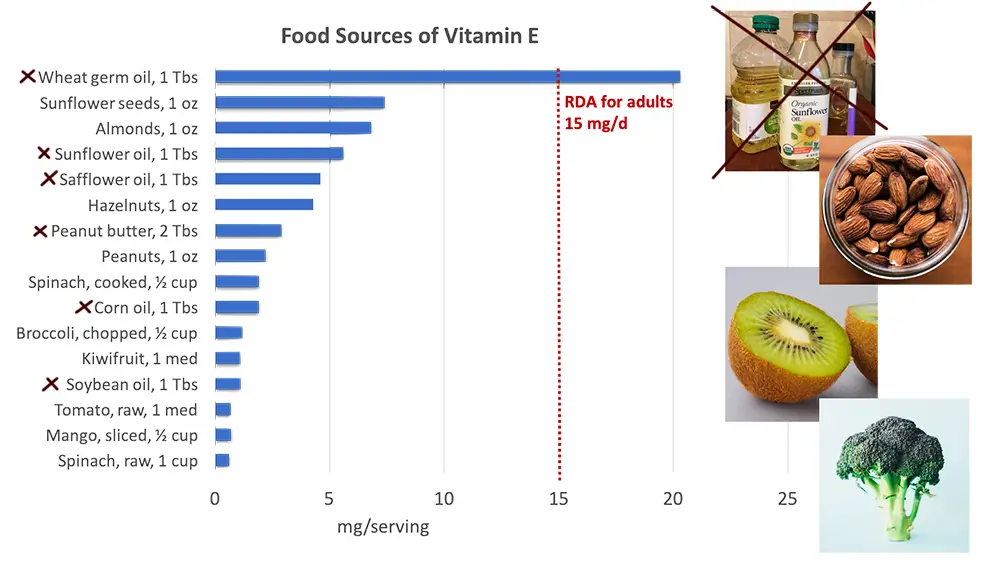
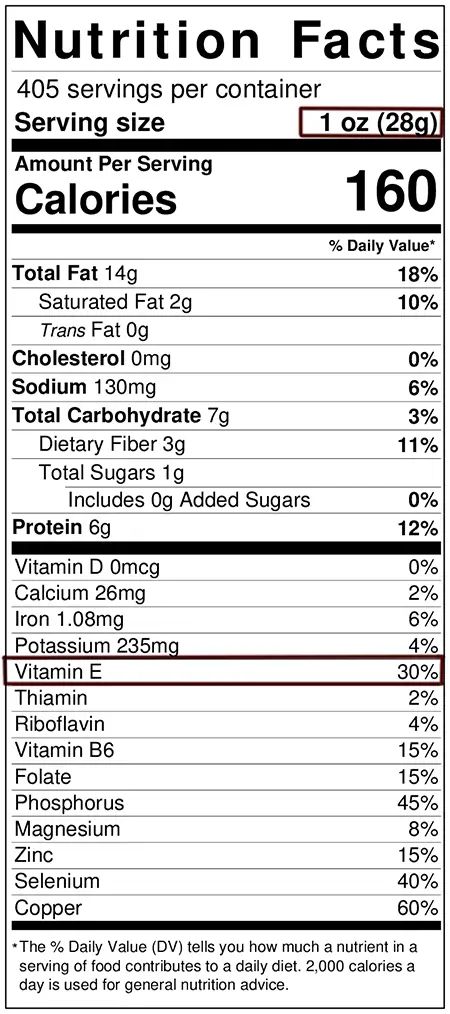
Conclusión:
- La dieta occidental estándar ha sido reconocida como fuente principal de todas las enfermedades de la opulencia, como las cardiopatías y los accidentes cerebrovasculares, el cáncer, la diabetes...
- Una dieta integral basada en plantas es una dieta congruente con los últimos 50 millones de años de nuestra evolución.
- El número de personas que realmente siguen una dieta basada en alimentos integrales de origen vegetal sigue siendo casi insignificante en comparación con el resto de la población.
- La dieta vegana no incluye productos elaborados a partir de animales y tendría un perfil nutricional muy o completamente distinto al de la dieta estadounidense estándar.
- La composición nutricional de macro y micronutrientes sería completamente diferente.
- En segundo lugar, y lo que es más importante, hay algunos nutrientes que sólo se encuentran o se encuentran en cantidades no adecuadas en un tipo de dieta.
- Para los carnívoros y omnívoros, el colesterol es un nutriente esencial, pero no para nosotros.
- Además de los macronutrientes, las plantas contienen numerosos fitoquímicos (fito significa planta en griego antiguo), y algunos de ellos son esenciales para la vida, como los carotenoides, los polifenoles y otros antioxidantes.
- Los productos animales están completamente desprovistos de cualquier tipo de antioxidantes y son gravemente proinflamatorios.
- La vitamina D es una carencia común. Afectará a todos los habitantes del planeta que no corran desnudos en pleno día por las sabanas africanas.
- El yodo es otra carencia universal.
- Nuestro cuerpo es capaz de controlar estrictamente nuestros niveles de hierro en sangre cuando sólo comemos verduras de hoja verde, pero cuando comemos carne todo ese hierro hemo pasará al torrente sanguíneo aunque no sea necesario.
- Tener un exceso de hierro o niveles de hierro por encima de los niveles mínimos requeridos no es óptimo, es proinflamatorio y la inflamación está correlacionada con una amplia gama de enfermedades, incluido el cáncer.
- En la mayoría de los casos, la anemia no está causada por la deficiencia de hierro, pero este sería un tema para otro artículo. Lo más probable es que la anemia en veganos esté causada por la deficiencia de B12 número uno, luego por la deficiencia de zinc número dos, y sólo después por la deficiencia de hierro número tres.
- Los veganos han mostrado la ingesta más baja de zinc en comparación con grupos con diferentes hábitos alimentarios.
- Los minerales nunca actúan solos, sino como un complejo de distintas sustancias.
- Cada mineral tiene minerales opuestos y otros minerales sinérgicos. Además, todos los minerales compiten por su absorción.
- Según investigaciones antropológicas, la ingesta diaria de proteínas antes de que la tecnología permitiera superar los 40 era paralela, entre 15 y 20 gramos cada día.
- Nuestro cuerpo guarda proteínas. Es el proceso de la autofagia.
- La proteína que se ha perdido de nuestro cuerpo en forma de piel, pelo y uñas muertas tiene que ser reemplazada.
- En cambio, la sobrealimentación constante con proteínas de alta calidad tiene graves consecuencias para la salud.
- Si sigues una dieta integral basada en plantas, deberás incorporar el ayuno intermitente para aprovechar todos los beneficios de la prevención del cáncer y la longevidad.
- Consumir demasiadas proteínas vegetales anulará algunos de los beneficios que una dieta vegana tiene en la prevención del cáncer y la longevidad.
- La ingesta de calcio en la mayoría de los veganos estaba por debajo de las recomendaciones (750 mg/día).
- La mayoría de la población humana es intolerante a la lactosa.
- Sólo el calcio orgánico es realmente biodisponible para las células de nuestro organismo.
- La osteoporosis no es una enfermedad por déficit de calcio.
- La carencia de magnesio y, en cierta medida, de vitamina D son las causas de la aparición de la osteoporosis en las dietas occidentales dominadas por los lácteos.
- El magnesio es necesario para más de 300 enzimas del cuerpo humano y una de esas enzimas es la que regula el metabolismo del calcio.
- El magnesio es una de las deficiencias más comunes y prevalentes en las dietas no veganas, ya que el magnesio se encuentra sobre todo en los alimentos vegetales.
- Demasiado calcio conduce a demasiado poco magnesio porque, en la rueda mineral, el magnesio y el calcio son minerales opuestos.
- Nuestro cuerpo fabrica K2 a partir de la vitamina K1, que se encuentra en las plantas.
- La B12 no está disponible para su absorción ya que se genera por debajo del íleon, que es donde se absorbe la B12.
- Un entorno evolutivamente incongruente con el agua limpia, más que una dieta incongruente, es el culpable de la deficiencia de B12 en los veganos.
- La B12 es una vitamina crucial para numerosos procesos del organismo, en particular para el desarrollo de los glóbulos rojos y la salud del sistema nervioso y el cerebro.
- B12, folato y B6 son las tres vitaminas que regulan los niveles de homocisteína.
- Cuando nuestro cuerpo produce creatina, también se crea homocisteína como subproducto.
- Si tomamos creatina como suplemento, reduciremos la necesidad de nuestro cuerpo de producirla internamente y, como consecuencia, tendremos niveles más bajos de homocisteína.
- El DHA es otra sustancia importante para prevenir el deterioro cognitivo.
- Coma una cucharada de semillas de lino recién molidas al día.
- Toma un suplemento de DHA a base de algas si tienes dinero.
- El ácido alfa-linolénico (ALA) es el aceite más sensible a la oxidación de todos los aceites existentes.
- Incluso con una dieta basada en alimentos vegetales integrales, la vitamina E es extremadamente difícil de obtener en cantidades adecuadas.
- La vitamina E es un antioxidante liposoluble que sólo se encuentra en las grasas.
- La principal fuente de vitamina E en la dieta occidental es precisamente el aceite vegetal.
- Incluso si utiliza una extracción de aceite casera para obtener aceite fresco, en cuanto se extrae el aceite, el contenido de vitamina E se reduce drásticamente.
- El calor acelera la oxidación.
- La vitamina E sintetizada no tiene actividad antioxidante in vivo.
- Varias investigaciones han demostrado un aumento de la mortalidad con el uso de vitamina E sintética.
Preguntas Frecuentes
Referencias:
Pasajes seleccionados de un libro: Pokimica, Milos. Go Vegan? Examen de Ciencias de la Parte 3. Kindle ed., Amazon, 2020.
- Sinha, R., Cross, A. J., Graubard, B. I., Leitzmann, M. F., & Schatzkin, A. (2009). Meat intake and mortality: a prospective study of over half a million people. Archivos de medicina interna, 169(6), 562-571. https://doi.org/10.1001/archinternmed.2009.6
- Guías Alimentarias para los Estadounidenses | health.gov. (s.f.). https://health.gov/our-work/nutrition-physical-activity/dietary-guidelines
- Thomas D. (2007). The mineral depletion of foods available to us as a nation (1940-2002)-a review of the 6th Edition of McCance and Widdowson. Nutrición y salud, 19(1-2), 21-55. https://doi.org/10.1177/026010600701900205
- Bailey, R. L., West, K. P., Jr, & Black, R. E. (2015). La epidemiología de las deficiencias mundiales de micronutrientes. Anales de nutrición y metabolismo, 66 Suppl 2, 22-33. https://doi.org/10.1159/000371618
- Berner, L. A., Keast, D. R., Bailey, R. L., & Dwyer, J. T. (2014). Los alimentos enriquecidos son los principales contribuyentes a la ingesta de nutrientes en las dietas de los niños y adolescentes estadounidenses. Revista de la Academia de Nutrición y Dietética, 114(7), 1009-1022.e8. https://doi.org/10.1016/j.jand.2013.10.012
- Rosanoff, A., Dai, Q. y Shapses, S. A. (2016). Interacciones de nutrientes esenciales: Does Low or Suboptimal Magnesium Status Interact with Vitamin D and/or Calcium Status?". Avances en nutrición (Bethesda, Md.), 7(1), 25-43. https://doi.org/10.3945/an.115.008631
- Dietrich, M., Jacques, P., Pencina, M., Lanier, K., Keyes, M., Kaur, G., Wolf, P., & Vasan, R. (2009). Vitamin E Supplement Use and the Incidence of Cardiovascular Disease and All-Cause Mortality in the Framingham Heart Study: Does the Underlying Health Status Play a Role? Aterosclerosis, 205(2), 549. https://doi.org/10.1016/j.atherosclerosis.2008.12.019
- Institute of Medicine (US) Panel on Dietary Antioxidants and Related Compounds. (2000). Ingestas Dietéticas de Referencia de Vitamina C, Vitamina E, Selenio y Carotenoides. National Academies Press (EE.UU.). [PubMed]
- Jiang, Qing. "Formas naturales de vitamina E: metabolismo, actividades antioxidantes y antiinflamatorias y su papel en la prevención y terapia de enfermedades". Biología y medicina de los radicales libres vol. 72 (2014): 76-90. doi:10.1016/j.freeradbiomed.2014.03.035
- Organización Mundial de la Salud. (2007). Necesidades de proteínas y aminoácidos en la nutrición humana : informe de una consulta mixta de expertos FAO/OMS/UNU. https://apps.who.int/iris/handle/10665/43411
- Fulgoni, V. L. (2008). Ingesta actual de proteínas en Estados Unidos: Analysis of the National Health and Nutrition Examination Survey, 2003-2004. El Diario Americano de la Nutrición Clínica, 87(5), 1554S-1557S. https://doi.org/10.1093/ajcn/87.5.1554S
- Delimaris I. (2013). Efectos adversos asociados con la ingesta de proteínas por encima de la ración dietética recomendada para adultos. ISRN nutrición, 2013, 126929. https://doi.org/10.5402/2013/126929
- Fallon, N., & Dillon, S. A. (2020). Low Intakes of Iodine and Selenium Amongst Vegan and Vegetarian Women Highlight a Potential Nutritional Vulnerability. Fronteras de la nutrición, 7. https://doi.org/10.3389/fnut.2020.00072
- Yeliosof, O., & Silverman, L. A. (2018). El veganismo como causa de hipotiroidismo por deficiencia de yodo. Revista de endocrinología y metabolismo pediátricos : JPEM, 31(1), 91-94. https://doi.org/10.1515/jpem-2017-0082
- Pawlak, R., Berger, J., & Hines, I. (2016). Estado del hierro en adultos vegetarianos: A Review of Literature. Revista americana de medicina del estilo de vida, 12(6), 486-498. https://doi.org/10.1177/1559827616682933
- Appleby, P., Roddam, A., Allen, N., & Key, T. (2007). Comparative fracture risk in vegetarians and nonvegetarians in EPIC-Oxford. Revista europea de nutrición clínica, 61(12), 1400-1406. https://doi.org/10.1038/sj.ejcn.1602659
- Plourde, M., & Cunnane, S. C. (2007). Extremely limited synthesis of long chain polyunsaturates in adults: implications for their dietary essentiality and use as supplements. Fisiología aplicada, nutrición y metabolismo = Physiologie appliquee, nutrition et metabolisme, 32(4), 619-634. https://doi.org/10.1139/H07-034
- Gerster H. (1998). ¿Pueden los adultos convertir adecuadamente el ácido alfa-linolénico (18:3n-3) en ácido eicosapentaenoico (20:5n-3) y ácido docosahexaenoico (22:6n-3)?. Revista internacional de investigación sobre vitaminas y nutrición. Revista internacional de investigación sobre vitaminas y nutrición. Revista internacional de vitaminología y nutrición., 68(3), 159-173. [PubMed]
- Brenna J. T. (2002). Efficiency of conversion of alpha-linolenic acid to long chain n-3 fatty acids in man. Opinión actual en nutrición clínica y cuidados metabólicos, 5(2), 127-132. https://doi.org/10.1097/00075197-200203000-00002
- Yang, C., Xia, H., Wan, M., Lu, Y., Xu, D., Yang, X., Yang, L., & Sun, G. (2021). Comparisons of the effects of different flaxseed products consumption on lipid profiles, inflammatory cytokines and anthropometric indices in patients with dyslipidemia related diseases: systematic review and a dose-response meta-analysis of randomized controlled trials. Nutrición y metabolismo, 18(1), 91. https://doi.org/10.1186/s12986-021-00619-3
- Shen, Y., Huang, X., Wu, J., Lin, X., Zhou, X., Zhu, Z., Pan, X., Xu, J., Qiao, J., Zhang, T., Ye, L., Jiang, H., Ren, Y., & Shan, P. (2022). The Global Burden of Osteoporosis, Low Bone Mass, and Its Related Fracture in 204 Countries and Territories, 1990-2019. Fronteras de la endocrinología, 13. https://doi.org/10.3389/fendo.2022.882241
- Mattson, M. P., Longo, V. D., & Harvie, M. (2017). Impacto del ayuno intermitente en los procesos de salud y enfermedad. Estudios sobre el envejecimiento, 39, 46-58. https://doi.org/10.1016/j.arr.2016.10.005
- Bachmeyer, C., Bourguiba, R., Gkalea, V., & Papageorgiou, L. (2019). Dieta vegana como causa desatendida de anemia megaloblástica grave y psicosis. Revista americana de medicina, 132(12), e850-e851. https://doi.org/10.1016/j.amjmed.2019.06.025
- Gilsing, A. M., Crowe, F. L., Lloyd-Wright, Z., Sanders, T. A., Appleby, P. N., Allen, N. E., & Key, T. J. (2010). Serum concentrations of vitamin B12 and folate in British male omnivores, vegetarians and vegans: results from a cross-sectional analysis of the EPIC-Oxford cohort study. Revista europea de nutrición clínica, 64(9), 933-939. https://doi.org/10.1038/ejcn.2010.142
- Smith, A. D., Smith, S. M., de Jager, C. A., Whitbread, P., Johnston, C., Agacinski, G., Oulhaj, A., Bradley, K. M., Jacoby, R., & Refsum, H. (2010). Homocysteine-lowering by B vitamins slows the rate of accelerated brain atrophy in mild cognitive impairment: a randomized controlled trial. PloS one, 5(9), e12244. https://doi.org/10.1371/journal.pone.0012244
- Douaud, G., Refsum, H., de Jager, C. A., Jacoby, R., Nichols, T. E., Smith, S. M., & Smith, A. D. (2013). Prevención de la atrofia de la materia gris relacionada con la enfermedad de Alzheimer mediante el tratamiento con vitamina B. Actas de la Academia Nacional de Ciencias de los Estados Unidos de América, 110(23), 9523-9528. https://doi.org/10.1073/pnas.1301816110
- Obersby, D., Chappell, D. C., Dunnett, A., & Tsiami, A. A. (2013). Plasma total homocysteine status of vegetarians compared with omnivores: a systematic review and meta-analysis. El British journal of nutrition, 109(5), 785-794. https://doi.org/10.1017/S000711451200520X
- Van Bavel, D., de Moraes, R., & Tibirica, E. (2019). Efectos de la suplementación dietética con creatina en la homocisteinemia y la función endotelial microvascular sistémica en individuos que se adhieren a dietas veganas. Farmacología fundamental y clínica, 33(4), 428-440. https://doi.org/10.1111/fcp.12442
- Liscum, L. (2008). Biosíntesis del colesterol. En Libros electrónicos de Elsevier (pp. 399-421). https://doi.org/10.1016/b978-044453219-0.50016-7
- Emerit, J., Beaumont, C., & Trivin, F. (2001). Metabolismo del hierro, radicales libres y lesiones oxidativas. Biomedicina y farmacoterapia = Biomedecine & pharmacotherapie, 55(6), 333-339. https://doi.org/10.1016/s0753-3322(01)00068-3
- Yu, Y., Yan, Y., Niu, F., Wang, Y., Chen, X., Su, G., Liu, Y., Zhao, X., Qian, L., Liu, P., & Xiong, Y. (2021). Ferroptosis: a cell death connecting oxidative stress, inflammation and cardiovascular diseases. Descubrimiento de la muerte celular, 7(1). https://doi.org/10.1038/s41420-021-00579-w
- Teucher, B., Olivares, M., & Cori, H. (2004). Potenciadores de la absorción de hierro: ácido ascórbico y otros ácidos orgánicos. Revista internacional de investigación sobre vitaminas y nutrición. Revista internacional de investigación sobre vitaminas y nutrición. Revista internacional de vitaminología y nutrición., 74(6), 403-419. https://doi.org/10.1024/0300-9831.74.6.403
- Bakaloudi, D. R., Halloran, A., Rippin, H. L., Oikonomidou, A. C., Dardavesis, T. I., Williams, J., Wickramasinghe, K., Breda, J., & Chourdakis, M. (2021). Ingesta y adecuación de la dieta vegana. A systematic review of the evidence. Nutrición clínica (Edimburgo, Escocia), 40(5), 3503-3521. https://doi.org/10.1016/j.clnu.2020.11.035
- Kondaiah, P., Yaduvanshi, P. S., Sharp, P. A., & Pullakhandam, R. (2019). Homeostasis e interacciones del hierro y el zinc: Does Enteric Zinc Excretion Cross-Talk with Intestinal Iron Absorption?". Nutrientes, 11(8), 1885. https://doi.org/10.3390/nu11081885
- Foster, M., Chu, A., Petocz, P., & Samman, S. (2013). Effect of vegetarian diets on zinc status: a systematic review and meta-analysis of studies in humans. Revista de ciencia de la alimentación y la agricultura., 93(10), 2362-2371. https://doi.org/10.1002/jsfa.6179
- Saunders, A. V., Craig, W. J., & Baines, S. K. (2013). Zinc y dietas vegetarianas. Revista médica de Australia, 199(S4), S17-S21. https://doi.org/10.5694/mja11.11493
- McLaren, D. S. (1974). EL GRAN FIASCO DE LAS PROTEÍNAS. The Lancet, 304(7872), 93-96. https://doi.org/10.1016/s0140-6736(74)91649-3
- Semba, R. D. (2016). Auge y declive de la malnutrición proteica en la salud mundial. Anales de nutrición y metabolismo, 69(2), 79. https://doi.org/10.1159/000449175
- Kubo, H., Sawada, S., Satoh, M., Asai, Y., Kodama, S., Sato, T., Tomiyama, S., Seike, J., Takahashi, K., Kaneko, K., Imai, J., & Katagiri, H. (2022). Insulin-like growth factor-1 levels are associated with high comorbidity of metabolic disorders in obese subjects; a Japanese single-center, retrospective-study. Informes Científicos, 12(1), 1-9. https://doi.org/10.1038/s41598-022-23521-1
- Peng, A. W., Dardari, Z., Blumenthal, R. S., Dzaye, O., Obisesan, O. H., Uddin, S., Nasir, K., Blankstein, R., Budoff, M. J., Mortensen, M. B., Joshi, P. H., Page, J. T., & Blaha, M. J. (2021). Very High Coronary Artery Calcium (≥1000) and Association With Cardiovascular Disease Events, Non-Cardiovascular Disease Outcomes, and Mortality. Circulación, 143(16), 1571-1583. https://doi.org/10.1161/circulationaha.120.050545
- Lafuente, M., Rodríguez González-Herrero, M. E., Romeo Villadóniga, S., & Domingo, J. C. (2021). Actividad antioxidante y papel neuroprotector de la suplementación con ácido docosahexaenoico (DHA) en enfermedades oculares que pueden conducir a la ceguera: A Narrative Review. Antioxidantes (Basilea, Suiza), 10(3), 386. https://doi.org/10.3390/antiox10030386
- Holub B. J. (2009). Ácido docosahexaenoico (DHA) y factores de riesgo de enfermedades cardiovasculares. Prostaglandinas, leucotrienos y ácidos grasos esenciales, 81(2-3), 199-204. https://doi.org/10.1016/j.plefa.2009.05.016
- Gerster H. (1998). ¿Pueden los adultos convertir adecuadamente el ácido alfa-linolénico (18:3n-3) en ácido eicosapentaenoico (20:5n-3) y ácido docosahexaenoico (22:6n-3)?. Revista internacional de investigación sobre vitaminas y nutrición. Revista internacional de investigación sobre vitaminas y nutrición. Revista internacional de vitaminología y nutrición., 68(3), 159-173. [PubMed]
- Pearson, P., Lewis, S. A., Britton, J., Young, I. S., & Fogarty, A. (2006). The pro-oxidant activity of high-dose vitamin E supplements in vivo. BioDrugs : inmunoterapias clínicas, biofármacos y terapia génica, 20(5), 271-273. https://doi.org/10.2165/00063030-200620050-00002
Contenidos Relacionados
¿Tienes alguna duda acerca de la nutrición y la salud?
Me encantaría saber de usted y responderlas en mi próxima publicación. Agradezco sus aportes y opiniones y espero tener noticias suyas pronto. También te invito a síguenos en Facebook, Instagram y Pinterest para más contenidos sobre dieta, nutrición y salud. Puedes dejar un comentario allí y conectar con otros entusiastas de la salud, compartir tus consejos y experiencias, y recibir apoyo y ánimo de nuestro equipo y nuestra comunidad.
Espero que este post le haya resultado informativo y ameno y que esté preparado para aplicar los conocimientos adquiridos. Si le ha resultado útil, por favor compártelo con tus amigos y familiares que también podrían beneficiarse de ella. Nunca se sabe quién puede necesitar orientación y apoyo en su camino hacia la salud.
– También Te Puede Interesar –

Aprenda Sobre Nutricion
Milos Pokimica es doctor en medicina natural, nutricionista clínico, escritor sobre salud médica y nutrición y asesor en ciencias de la nutrición. Autor de la serie de libros Go Vegan? Revisión de la Ciencia, también dirige el sitio web sobre salud natural GoVeganWay.com.
Descargo De Responsabilidad Médica
GoVeganWay.com le ofrece reseñas de las últimas investigaciones relacionadas con la nutrición y la salud. La información proporcionada representa la opinión personal del autor y no pretende ni implica sustituir el asesoramiento, diagnóstico o tratamiento médico profesional. La información proporcionada tiene fines informativos únicamente y no pretende sustituir la consulta, el diagnóstico y/o el tratamiento médico de un médico o proveedor de atención médica calificado.NUNCA ignore el CONSEJO MÉDICO PROFESIONAL O RETRASAR la BÚSQUEDA de TRATAMIENTO MÉDICO a CAUSA DE ALGO QUE HAYA LEÍDO EN O accesibles a TRAVÉS de GoVeganWay.com
NUNCA APLICAR CUALQUIER cambio de ESTILO de vida O CAMBIOS EN su totalidad COMO UNA CONSECUENCIA DE ALGO QUE HA LEÍDO EN GoVeganWay.com ANTES de CONSULTAR con LICENCIA PROFESIONAL MÉDICO.
En el caso de una emergencia médica, llame a un médico o al 911 inmediatamente. GoVeganWay.com no se recomienda ni aprueba ninguna de los grupos, las organizaciones, las pruebas, los médicos, productos, procedimientos, opiniones u otra información que pueda ser mencionado en el interior.
Selecciones del editor –
Milos Pokimica es escritor especializado en salud y nutrición y asesor en ciencias nutricionales. Autor de la serie de libros Go Vegan? Revisión de la Ciencia, también dirige el sitio web sobre salud natural GoVeganWay.com.
Últimos artículos -
Top Noticias De Salud — ScienceDaily
- The overlooked nutrition risk of Ozempic and Wegovyen febrero 4, 2026
Popular weight-loss drugs like Ozempic and Wegovy can dramatically curb appetite, but experts warn many users are flying blind when it comes to nutrition. New research suggests people taking these medications may not be getting enough guidance on protein, vitamins, and overall diet quality, increasing the risk of muscle loss and nutrient deficiencies.
- A 25-year study found an unexpected link between cheese and dementiaen febrero 4, 2026
A massive Swedish study tracking nearly 28,000 people for 25 years found an unexpected link between full-fat dairy and brain health. Among adults without a genetic risk for Alzheimer’s, eating more full-fat cheese was associated with a noticeably lower risk of developing the disease, while higher cream intake was tied to reduced dementia risk overall. The findings challenge decades of low-fat dietary advice but come with important caveats.
- MIT’s new brain tool could finally explain consciousnessen febrero 4, 2026
Scientists still don’t know how the brain turns physical activity into thoughts, feelings, and awareness—but a powerful new tool may help crack the mystery. Researchers at MIT are exploring transcranial focused ultrasound, a noninvasive technology that can precisely stimulate deep regions of the brain that were previously off-limits. In a new “roadmap” paper, they explain how this method could finally let scientists test cause-and-effect in consciousness research, not just observe […]
- Why heart disease risk in type 2 diabetes looks different for men and womenen febrero 4, 2026
Scientists are digging into why heart disease risk in type 2 diabetes differs between men and women—and sex hormones may be part of the story. In a large Johns Hopkins study, men with higher testosterone had lower heart disease risk, while rising estradiol levels were linked to higher risk. These hormone effects were not seen in women. The results point toward more personalized approaches to heart disease prevention in diabetes.
- Sound machines might be making your sleep worseen febrero 4, 2026
Sound machines may not be the sleep saviors many believe. Researchers found that pink noise significantly reduced REM sleep, while simple earplugs did a better job protecting deep, restorative sleep from traffic noise. When pink noise was combined with outside noise, sleep quality dropped even further. The results suggest that popular “sleep sounds” could be doing more harm than good—particularly for kids.
- This unexpected plant discovery could change how drugs are madeen febrero 3, 2026
Plants make chemical weapons to protect themselves, and many of these compounds have become vital to human medicine. Researchers found that one powerful plant chemical is produced using a gene that looks surprisingly bacterial. This suggests plants reuse microbial tools to invent new chemistry. The insight could help scientists discover new drugs and produce them more sustainably.
- A hidden cellular process may drive aging and diseaseen febrero 3, 2026
As we age, our cells don’t just wear down—they reorganize. Researchers found that cells actively remodel a key structure called the endoplasmic reticulum, reducing protein-producing regions while preserving fat-related ones. This process, driven by ER-phagy, is tied to lifespan and healthy aging. Because these changes happen early, they could help trigger later disease—or offer a chance to stop it.
PubMed, #Dieta vegana –
- Diet type and the oral microbiomeen febrero 2, 2026
CONCLUSION: The diet-oral microbiome-systemic inflammation axis is bidirectional and clinically relevant. Understanding both direct ecological regulation and indirect metabolic effects is essential to support precision nutrition strategies aimed at maintaining oral microbial balance and systemic inflammatory risk mitigation.
- Consensus document on healthy lifestylesen enero 22, 2026
Proteins are a group of macronutrients that are vital to our lives, as they perform various functions, including structural, defensive and catalytic. An intake of 1.0-1.2 g/kg/body weight per day would be sufficient to meet our needs. Carbohydrate requirements constitute 50 % of the total caloric value and should be obtained mainly in the form of complex carbohydrates. In addition, a daily intake of both soluble and insoluble fiber is necessary. Regular consumption of extra virgin olive oil […]
- Vitamin B12 and D status in long-term vegetarians: Impact of diet duration and subtypes in Beijing, Chinaen enero 21, 2026
CONCLUSIONS: This study reveals a dual challenge among Beijing long-term vegetarians: vitamin B12 deficiency was strongly associated with the degree of exclusion of animal products from the diet (veganism), while vitamin D deficiency was highly prevalent and worsened with longer diet duration. The near-universal vitamin D deficiency observed in this study suggests that, in the Beijing context, the risk may extend beyond dietary choice, potentially reflecting regional environmental factors;…
- Nutritional evaluation of duty meals provided to riot police forces in Germanyen enero 13, 2026
Background: The primary role of the German riot police is maintaining internal security. Due to challenging working conditions, riot police forces face an elevated risk of various diseases. During duty, forces are provided with meals. A balanced diet can reduce the risk of some of these diseases and contribute to health-promoting working conditions. Aim: First evaluation of the nutritional quality of duty meals in Germany based on German Nutrition Society recommendations (DGE). Methods: In…
- Iodineen enero 1, 2006
Iodine is an essential trace nutrient for all infants that is a normal component of breastmilk. Infant requirements are estimated to be 15 mcg/kg daily in full-term infants and 30 mcg/kg daily in preterm infants.[1] Breastmilk iodine concentration correlates well with maternal urinary iodine concentration and may be a useful index of iodine sufficiency in infants under 2 years of age, but there is no clear agreement on a value that indicates iodine sufficiency, and may not correlate with […]
Publicaciones aleatorias –
Publicaciones destacadas -
La última versión desde PubMed, #Dieta basada en plantas –
- From paddy soil to dining table: biological biofortification of rice with zincpor Lei Huang en febrero 4, 2026
One-third of paddy soils are globally deficient in zinc (Zn) and 40% of Zn loss in the procession from brown rice to polished rice, which results in the global issue of hidden hunger, e.g., the micronutrient deficiencies in the rice-based population of developing countries. In the recent decades, biofortification of cereal food crops with Zn has emerged as a promising solution. Herein, we comprehensively reviewed the entire process of Zn in paddy soil to human diet, including the regulatory…
- Molecular Characterization of Tobacco Necrosis Virus A Variants Identified in Sugarbeet Rootspor Alyssa Flobinus en febrero 3, 2026
Sugarbeet provides an important source of sucrose; a stable, environmentally safe, and low-cost staple in the human diet. Viral diseases arising in sugarbeet ultimately impact sugar content, which translates to financial losses for growers. To manage diseases and prevent such losses from occurring, it is essential to characterize viruses responsible for disease. Recently, our laboratory identified a tobacco necrosis virus A variant named Beta vulgaris alphanecrovirus 1 (BvANV-1) in sugarbeet…
- Nutrition in early life interacts with genetic risk to influence preadult behaviour in the Raine Studypor Lars Meinertz Byg en febrero 3, 2026
CONCLUSIONS: Nutrition in early life and psychiatric genetic risk may interact to determine lasting child behaviour. Contrary to our hypothesis, we find dietary benefits in individuals with lower ADHD PGS, necessitating replication. We also highlight the possibility of including genetics in early nutrition intervention trials for causal inference.
- Effect of the gut microbiota on insect reproduction: mechanisms and biotechnological prospectspor Dilawar Abbas en febrero 2, 2026
The insect gut microbiota functions as a multifunctional symbiotic system that plays a central role in host reproduction. Through the production of bioactive metabolites, gut microbes interact with host hormonal pathways, immune signaling, and molecular regulatory networks, thereby shaping reproductive physiology and fitness. This review summarizes recent advances in understanding how gut microbiota regulate insect reproduction. Accumulating evidence demonstrates that microbial metabolites…
- Rationale and design of a parallel randomised trial of a plant-based intensive lifestyle intervention for diabetes remission: The REmission of diabetes using a PlAnt-based weight loss InteRvention…por Brighid McKay en febrero 2, 2026
CONCLUSIONS: This trial will provide high-quality clinical evidence on the use of plant-based ILIs to address the epidemics of obesity and diabetes to inform public health policies and programs in Canada and beyond.
- Diet type and the oral microbiomepor Daniel Betancur en febrero 2, 2026
CONCLUSION: The diet-oral microbiome-systemic inflammation axis is bidirectional and clinically relevant. Understanding both direct ecological regulation and indirect metabolic effects is essential to support precision nutrition strategies aimed at maintaining oral microbial balance and systemic inflammatory risk mitigation.




